#but i feel like it's a very character-defining part of her arc!
Explore tagged Tumblr posts
Note
Heya! 2, 6, 29, B from the uncommon asks for any/as many ocs as you'd like! c:
Ooh, thank you for the ask!! I think for these, I'll go with my Rook, Lydia Laidir and my Watcher, Sabina Lancaster <3
2. How easy is it for your character to laugh?
Lydia: Pretty easy, though it's rarely a genuine laugh and more of a little "heh" kinda laugh, and usually I think she's mostly interested in getting other people to laugh. I'd say she's more likely to really laugh at something that happened to be funny organically, rather than anything intended as an actual joke.
Sabina: Very easy. Sabina can a giggly mess sometimes, and she has a huge weakness for puns. It's not put on either - she genuinely just finds many aspects of life to be pretty funny, and she finds that laughter can, at times, lift the weight that's pretty much perpetually dragging her down.
6. Do they consider laws flexible, or immovable?
Lydia: The only law that matters to Lydia is the one written on her heart. The "law" allowed for her and her family to be enslaved in Tevinter, the "law" has kept her people in oppression by way of alienages and circle towers, and the "law" is what protects corrupt Rivaini nobles. She knows right from wrong, and she uses the compass of her heart to decide what she needs to do, not some words on paper held in a vault somewhere.
Sabina: Sabina gets why the laws are the way they are, she really does. She believes that most of the corruption in the world comes from either the misapplication of the law or the absence of it, but the laws themselves are there to keep people safe and make good choices. She's been in too many city underbellies and seen too many good people fall victim to those with no respect for the law, and on top of that, she recognizes each place she's visited has had slightly different laws to reflect the needs of their community. That being said, sometimes she believes you gotta do what you gotta do, and she is willing to bend the law (or hopefully find some kind of legal loophole) if she feels like it's obstructing true justice.
29. Do they usually live up to their own ideals?
Lydia: She tries so hard, but no, not really. Especially in her early days with the Lords, she did a lot of things that she later felt pretty ashamed of, such as stealing from the needy and directing her anger at those who didn't deserve it. Much of the reason she's in the Veilguard in the first place is because she's hoping to atone for some of those things. She does better nowadays, she only steals from those she deems can afford it, like nobles, and she's less likely to blow up in anger, but the latter one still happens more often than she'd like (though, given what she's goes through in datv her reactions are understandable).
Sabina: Usually? Yes, she wouldn't ask anything of other people she didn't think she was also fully capable of. She believes one should always be ready to help those in need, she believes in fairness and freedom of will, and above all, she believes in being an honest person. The last one is even a huge point of friction between her and Aloth, and the one she holds herself to the most strongly. Except, of course, when it comes to lying about who destroyed the Brass Citadel and placing the blame on Alvari. She really, truly believes it's the best course of action and that the Huana deserve to reclaim Ukaizo. Nevertheless, the lie tastes like ash in her mouth, and she feels from that point on like something fundamental had broken within her.
B) What inspired you to create them?
Lydia: Ever since the Inquisitor stabbed the Tevinter Imperium on the map at the end of Trespasser, I knew my hypothetical DA4 protagonist was going to be from Tevinter. And then we learned more about the game, and the Tevinter faction, the Shadow Dragons were....eh? They were fine, but not really what I was hoping for. And one of the other factions, the Lords of Fortune, just looked so cool, and Rivain sounded so cool, and the fact that Rook Laidir left a corrupt noble to die at the bottom of the ocean sounded so cool! So I came up with the idea of having a multicultural Rook, originally from Tevinter but who grew up in Rivain (which was then confirmed to be canon in the game, much to my surprise!) and when I decided she was going to be an elf, that's when the Tevinter slavery aspect entered into things. I'd also been watching a lot of Arcane at the time, and I think some aspects of Vi's character ended up rubbing off on Lydia subconsciously (especially the idea that she's very quick to choose violence as the solution, and that's she's a little uncomfortable with that fact)
Sabina: With so much going on in the world of Eora race-wise, I liked the idea of playing a character who was. Just a regular dude. I think Sabina has some of the most aspects of myself in her of any of my OCs, from her appearance to her love of animals to her aforementioned giggly disposition. I went with the Drifter background because I was originally going for a more con-man-esque character who fit into the archetype of the Dashing Rogue, before I realized that I enjoyed playing a character with a more rigid moral compass, and then I had to adapt her backstory to fit that. And then I made her a ranger after playing Dead fire and going ":) Deer!! :D"
Uncommon Questions: Send me a # (questions for OCs) or a letter (questions for creators)
#thank you for the ask <333 sorry this got kinda wordy (especially sabina's) i got into the Groove of it#also i feel like this is like the third time i've brought up the Ukaizo moment when talking about Sabina#but i feel like it's a very character-defining part of her arc!#also a reminder that i'm doing my best to be respectful re: lydia's backstory#but i do wanna also explore the problems it would have given her#datv#pillars of eternity#datv spoilers#watcher sabina lancaster#layalu#ask#oc: lydia laidir
9 notes
·
View notes
Text
While I still feel like we should have gotten way more of Elita in TFOne, I do like what we saw of her and how she serves as a contrast to D-16. This especially goes for their respective relationships with Orion.
D-16 and Elita are pretty similar when you think about it. They are both pretty serious and driven people who both earnestly committed themselves to the system in hopes of climbing the latter.
Though its worth noting that while Elita is very proactive when it comes to climbing the latter, constantly chasing promotions, D-16 is much more passive, choosing to keep his head low and slowly but steadily work his way up.
When they learn the truth about Sentinel Prime's rule and how they were deceived and exploited, Elita does not lose herself to anger the way D-16 does, despite her intense devotion to succeeding within the system being her defining trait up until this point. I wish her feelings on the matter were explored more, but its clear her focus purely becomes about exposing Sentinel and freeing her fellow miners.
This is where Elita and D-16 go in complete opposite directions in terms of character development, which is illustrated in how they treat Orion.
D-16 completely shuts Orion out, even becoming aggressive towards him and blaming him for the pain of learning the truth. He completely disregards anything Orion has to say, paying no mind to any plan or strategy Orion proposes. He starts to treat him as a hindrance, and even before their relationship began to degrade, he was very reluctant to take part in Orion's "schemes." This of course, is what culminates in "I'm not saving you anymore" and D-16 deciding to drop Orion.
Then there is Elita, who in Orion's darkest hour, takes it upon herself to try and uplift him despite her inexperience with any sort of emotional intimacy. She makes it clear that she values his plans, his optimism, and his rebellious nature, everything D-16 grew to resent him for.
Both Elita and D-16 have very aggressive personalities, but while D-16 uses his to dominate his way to the top of the decepticon hierarchy, Elita uses her's to uplift Orion. She commands the attention of the other miners when Orion is too soft spoken to do so himself, and together they lead their people against their shared tyrant (much like what Orion wanted to do with D-16).
I personally love this dynamic between them. Elita having already mastered the assertive aspect of leadership, without the ability to adequately inspire or be charismatic; whereas Orion/Optimus brings the ideology and charisma to the equation, without the ability to properly assert himself in a way that leadership requires. (If I'm allowed to be unserious for a second, its very "Excuse me! He asked for no pickles")
While it's unclear if the writers intend to pursue a romantic arc between Optimus and Elita in the sequel, it's obvious by Optimus' decision to make Elita his Major that they will be working very closely with together going forward. While Orion may have been powerless to preserve his relationship with D-16, Optimus' relationship with Elita is the one he will be forging going into the future.
#tfone#transformers one#elita one#elita 1#maccadam#orion pax#optimus prime#d 16#megatron#tf#transformers#oplita#kaysposts
555 notes
·
View notes
Text
Another thing about Steven Universe as character (and the series) that has been mischaracterized over the course of the years and the source of a good chunk of discourse online is the relationship that Steven has with the Diamonds.

A lot of videos, posts and memes have spread around the idea that Steven went to Homeworld in the final arc of the series because he wanted to ¨be besties¨ with the Diamonds, when what happens in the actual show is very different.

In the episode "Legs from Here to Homeworld"-which takes place after the episode ¨Reunited¨ that Blue and Yellow Diamond find out that Rose Quartz was in fact Pink Diamond- Steven shows to Blue and Yellow one of the corrupted gems (Centipeetle) and helds them accountable for making a lot of gems end up this way and orders them to fix the mess they caused.

Steven: ¨Do it again! It was working!¨ Yellow Diamond: ¨How long do you expect us to hold her together?¨ Steven: ¨I don’t know. Forever! You did this! So you have to do something!¨
Seeing they need White Diamond to fix the corrupted gems, Steven thinks of going to gem Homeworld to see if he can talk to White about the corrupted gems and convince her to come to Earth and help them.
That's the main reason Steven goes to Homeworld- he doesn't like the Diamonds nor wants to be friends with them- he just wants to see if White Diamond can listen to him and help to heal the corrupted gems.

He is aware that the Diamonds listen to him because he himself is a Diamond-Pink Diamond. So he goes along with this little game pretending to be Pink thinking that way White Diamond and the others will listen to him. He believes that maybe as ¨Pink¨ he can make them see the errors of their ways and stop this mini war conflict that he has been caught on in the last few years.
Others have made more detailed analysis about this in the past, that a good part of this arc has a huge trans/queer metaphor for Steven's character- where he keeps being refered to and imposed an identity he doesn't see himself as. He gets called by the Diamonds and other homeworld gems as ¨Pink Diamond¨ and refered to as ¨She¨, when he often corrects and clarifies that he prefers to be called ¨Steven¨.

The final showdown against White Diamond is about this: White keeps trying to play mind games with Steven, making him believe that Pink/Rose is still alive in him and he is in fact Pink/Rose. Because Steven doesn't know this for certain, it proves to be effective for a while, making him feel very confused.
White believes that she is perfect in every way- it is what all her identity is about. She is obsessed with her own perfection so much that she doesn't allow herself to think that she has flaws nor she can't be wrong about something- and because she thinks she has to be perfect, that means that she is right about Pink Diamond still existing inside Steven.
The reality proves her wrong when she takes out Steven's gem and everyone sees that the gem part turns into Steven. As a way of metaphor to a trans allegory and self love, Steven sees that he has always been himself and he shouldn't let other people define what his identity should be, that only him should decide that.

So, in a way, the Diamonds Days arc is intended to be seen as a metaphor to a LGBT+ kid/teenager standing up against their relatives, grandmothers or aunts in this case- and prove them wrong about their identity, that they are what they are and their family can't change that.
Okay, so Steven proves the Diamonds that they are wrong, they change their minds and they help with healing the corrupted gems by the end of ¨Change Your Mind¨.
Does this means Steven becomes friends with them after this?
Well... no
In Steven Universe The Movie, during the song sequence ¨Lets Us Adore You¨ the Diamonds beg Steven to stay with them a bit longer because they miss having Pink around, Steven is seen very uncomfortable around them and wants to get out as quickly as possible to return to Earth.

He sees them as somewhat allies and tries to persuade them in different ways to improve the current situation on Homeworld but he doesn't seem to like them much and doesn't enjoy being around them even if they aren't acting antagonistic towards him anymore.
He has a similar reaction when they come to Earth near the end of the movie. He is very done with them and says that they staying to leave on Earth isn't a good idea on the long run. Instead he shows Spinel to them and Spinel sees this as an opportunity to make a new friend again.

Well, about SU Future? How does Steven feel about them in that series?
In Future is where Steven begins to show real strong PTSD trauma symptoms (something he has had for a while except it wasn't nearly as strong). He knows that he has a problem most of the show but he avoids going to ask the Diamonds for help because he just feels very uncomfortable around them and it reminds him of traumatic experiences he had with them in Diamonds Days arc.
He doesn't go to them until after he accidentally shatters Jasper in ¨Fragments¨ and sees himself as a monster because of this. He separates himself from the rest of the crystal gems, feeling like he is as terrible as the Diamonds were. In ¨Homeworld Bound¨ he interacts with the three Diamonds, asking them for any way they can help him with his powers.

Most of the episode he feels frustrated because A) He can't find a solution to his problem and B) Sees that the Diamonds and Spinel are doing pretty well and he has been getting worse. It makes him get more and more angry the more time he spends in there.
The scene that leaves pretty clear how he feels about them, specially White, is when he talks to White. As shown in the gif above, when White touches Steven near where his gem is, Steven pushes her hand off from him, clearly being reminded of the time White ripped his gem off him in ¨Change Your Mind¨.
White uses her powers so Steven can talk to own self. This leads to an iconic scene that Steven gets angry at himself and White. He has a very strong intrusive thought of crashing White's gem into a pillar for what she put him through. He gets shocked for this and makes him run away scared as result.

This scene leaves clear that Steven has a lot of buried resentment for what the Diamonds did to him, mainly White. Being around them reminds him of his trauma, it makes him deeply uncomfortable and he would rather avoid them as much as possible.
The Diamonds get concerned about Steven and show up during the events of ¨I Am My Monster¨ when Steven transforms into gem like monster. The Diamonds and Spinel blame themselves for Steven feeling this way because of their past actions. White feels it is her fault because of how she hurt Pink Diamond and this brought problems to Steven.

They help with calming Steven down and him returning to his human form. Now there is some argument to be said about why they took part of this hug aside from using their powers to help the gems. I have talked more about this in here but i think it is to represent Steven accepting himself as being part Diamond and maybe forgiving, realizing that he isn't an ¨irredeemable monster¨ because of what he did, that way he stops seeing himself as one and goes back to his normal form.
After this, it is a bit unclear where Steven stands his opinion on his relationship with the Diamonds. I would assume that it is probably not much different than it was before. He still doesn't like them and probably doesn't want to be around them even after all that happened.
In short: Steven sees the Diamonds as allies and post the events of ¨Change Your Mind¨ he shows to be uncomfortable being around them, he doesn't seem to like them and mostly prefers to avoid them. He is glad that they are changing their ways for the better but he would prefer to not interact with them if he doesn't have to due to his own trauma.
The Diamonds regret how they have hurt Steven (and Pink) and care about Steven but he thinks it is better for him to have a distant relationship with them for the reasons i discussed. They can still improve and make amends for everything they did and Steven doesn't have to feel forced to have a relationship with them if he doesn't want to.
There are other things that could be discussed, about how the Diamonds Days arcs should have been longer or how the Diamonds needed more screen time- However, the point of this post is talk about people have mischaracterized Steven's relationship with the Diamonds, saying Steven is best friends with them when in reality he doesn't like them and spends most of Future series avoiding them.
#steven universe#su future#steven quartz universe#the diamonds#pink diamond#blue diamond#yellow diamond#white diamond#su analysis
730 notes
·
View notes
Text
Why Timebomb shouldn't exist in s2 (part 3 - Relationship)

Part 1 - Ekko Part 2 - Jinx
Now let's look closer at relationship itself between Ekko and Jinx that was shown in the series.
To begin with, I will briefly define my position - I don't ship Ekko and Jinx. But! I can appreciate something, even if it doesn't match my preferences, as long as it's written well.
Timebomb wasn't written well, guys. The foundation - the characters themselves - has already crumbled, as I pointed out in previous posts, and everything else followed behind.
Ekko had a crush on Jinx as a child, yes. But Jinx was killing his friends. Jinx was following Silco's orders, and I'll remind you that Silco killed Benzo and it was because of Silco that zaunites got hooked on shimmer. Forgiving all her actions and understanding why Jinx willingly followed Silco would have taken Ekko muuuuuuuuch longer than it was shown in the series. To cite their childhood bond is to reduce the depth of their conflict and importance of firelights to Ekko.
It's even worse on Jinx's side. Throughout both seasons (except for act1 s1), she doesn't think and talk about Ekko. Zero thoughts about him, zero reflection, as if she didn't care about him at all. All I see in her is a feeling of nostalgia for old friendships in a moment of vulnerability. How am I supposed to believe in their connection if one of the characters doesn't have a single second thought about the other?
And finally, episode 7. Why does it exist (regarding Ekko arc and his realationship with Jinx)? Does it reveal the characters in any way? Well, everyone except Ekko and Heimer are completely fucking different people and have nothing to do with the original ones, so I don't give a damn about them at all. Perhaps Ekko reveals himself more as a character? Mm… And how? What's new we find out about him? That he could be Heimer's student? We already knew he was smart. That he could have dated Powder if things had turned out differently? Well, thanks for the information, but why do I need it? Wouldn't you rather to reveal relationship between Ekko and original Powder/Jinx instead of wasting time on "what if"? Did Ekko need to make a time machine in alternative timeline? No, he could do it in canon timeline just fine.
Also, this "what if" does not serve to reveal relationship between Ekko and Jinx in original timeline. Or did Ekko need to see Powder (like a good version of Jinx) to understand that Jinx is a grown-up Powder and that she is still inside Jinx, and not gone as he thought? Well, you know, I personally saw it already shown in s1 on the bridge (in much more emotional moment with original Powder/Jinx lol).
And what do we have as result:
Ekko is not fully revealed; Jinx has become an OOC; their connection is not shown either through reflection, through characters thoughts, or through any interactions/mentions with other characters; they have very little screen time together - Powder in alternative timeline doesn't count bc she is completely different person; they get along with a snap of fingers as if they hadn't been enemies for many years; Jinx murdering Ekko's friends have no influence at all; restoration of their friendship takes place in a very short unrealistic period of time and, moreover, off screen; the romantic line is sucked out of the finger only to please shippers and is very poorly written.
Timebomb is the ship that demands slow burn if you don't want to fuck up the characters. It demands to attend to their complicated story and broken relationship before going anywhere romantic.
But all of it was brushed aside and that's why i'm not happy about Timebomb existing. Because Jinx's and Ekko's personalities, their complex history and their potential was sacrificed for the sake of this ship.
105 notes
·
View notes
Text
while watching todays episode of the reboot i had a thought and yes this is going to include some manga spoilers for later on in the manga as well.
I know that Akane's fantasies from the sleep incense has become like a joke but in looking more at today's episode there is definitely something i recognized. Ranma does very much have that protective nature to him its shown so many times over and over again and in the episode today i noticed it more than when i watched og. So to clarify having someone be protective over you is by far one of the most attractive things IMO and because of that i don't blame Akane to really start falling hard for him around this time.
In the reboot, he shields Akane from the impact of the attack with his whole body, while in Og, he kind of flips her around, so he is the one slamming into the wall. That being said, the reboot is blatant about how he would flat-out risk his own safety to make sure she is okay because that impact was not a slight bump into the wall.

this is definently something that gets paralleled much later into the series in the last arc where akane basically plays an uno reverse card and flat out he becomes unresponsive in the sense of "oh hey i possibly just lost her and i failed to protect her".

he is shown so many times over to just overall be protective about the people in his life he protects Nabiki from a fall, Ukyo he protects her feelings during the secret sauce arc, and heck he has even gone out on a limb for Ryoga time or two as well. honestly being protective is something that I personally consider to be a big part of who Ranma is It is also something he holds pride in himself for. He could have lived with the rejection in the reverse jewel arc, it hurt his pride but he didn't become unresponsive like he does when he fails to protect Akane and subsequently believes he lost her.
The more Ranma cares about someone the more he is willing to protect them, he flat out risks himself by potentially revealing his transformation to his mother because he flat out goes in to save her after the water main busts also same thing when she finally figures out ranko is ranma and that really happens because he is unwilling to risk losing his mom as well there when he dives straight into the ocean to save her.

While Ranma may not be as good of a communicator with words he defiantly communicates with actions. and I have no clue why it took me so long to realize that this is so ingrained in who he is as a character. There are also other times as when he goes out of his way to guard Akane when the old perv is trying to use incense on her when Mikado is trying to kiss her, etc. he knows she can take care of herself but if he can keep her from having to result to beating someone up when he can do it instead he will and this starts to like the second day after he met her when he jumped in to protect her from kuno.
96 notes
·
View notes
Text
I'm surprised at the hate that Sokka's character arc from NATLA is receiving. To me, Sokka's development and characterization was one of the strongest adaptations the series made.
In the original ATLA, Sokka's character arc revolves around him unlearning his own misogyny. He makes pointedly sexist comments throughout the early episodes like "Leave it to a girl to screw things up!", "There's no way a bunch of girls took us down!", etc.
Sokka's comments have a strong narrative purpose: they give a platform for women in the show (Katara & Suki mostly) to refute his attitude. Katara emphasizes traditional "women's work" (cleaning, cooking, sewing, etc), which forces Sokka to confront its inherent value. Suki is able to prove to him that women can fight too and he learns to respect female warriors. It's a great character arc and it's well-executed.
It's also characterization that is in direct response to the culture and feminism of the 90s and early 00s. The representation of women in the media at that time was...oof. It was not great. One-dimensional love interests whose only purpose is being saved by the male protagonist, mostly. Female protagonists were not as common, and certainly not ones who were depicted as being able to fight, and certainly not in cartoons. Female protagonists in animation were almost exclusively princesses.
ATLA was progressive in this regard. Katara was a complex female character in a time when there were not a lot of them, in media in general but especially in animation and kid's shows. (I grew up in the 90s; there were no characters like Katara in animation on screen for me.) ATLA incorporated the zeitgeist directly into the story, which is why we have Sokka learning to overcome his sexism in his interactions with Strong Female Characters.
If you go back and watch the original cartoon now, Sokka's sexism feels a bit dated. It's a very 90s, Girl Power, "girls can fight too" style of social commentary. It doesn't match with the media landscape of today. We've got 20 years of media with female superheroes behind us. If your message is "girls can fight too!" the response for the most part is going to be "yes, we know that. And?"
So imagine you're adapting the original ATLA for a live-action remake. You want to keep Sokka's character arc intact, but you want to update it for the 2020s. So what do you do? You look at the conversations that are happening today.
The 90s were about "girls can do everything boys can do", but the 20s are over that. The conversation is more about gender: gender expression, gender roles, gender dynamics. What does is mean to be a woman? What does it mean to be a man?
Sokka's character arc in NATLA is focused on this question: What does it mean to be a man? At the beginning of the series, it's his identity as a warrior that defines him. He needs to be the warrior, the protector, the leader. He's constantly trying to reaffirm this part of his identity, and it's completely tied up in his perception of his value as a man. Instead of his interactions with Suki being about "how could girls possibly be warriors", it shifts to Sokka saying "I'm ALSO a warrior" and trying to justify that to Suki (and mostly himself).
His arc over the series is about him accepting other aspects of himself and relearning how to define his masculinity. He can still have value as man without being the greatest warrior. He can still have value as a man by using his skills as an engineer. He can still have value as a man by offering compassion and kindness to others, like the little girl with the doll & Yue in her final moments. Instead of rigidly defining himself by a specific set of gender roles & expectations, he learns how to define himself through his own strengths and qualities.
I know there are a lot of people who are upset at this change to Sokka's characterization, and the most common thing I see is that it results in changes to Katara's character and her anger in response to Sokka's comments. I think there are valid criticisms to be made about how the show handled the adaptation of Katara's character, but I won't go there with this. In terms of Sokka and his characterization, it was well-done and thematically consistent with the original. It's not an exact port, and it never needed to be. It's still a feminist arc that centres on unlearning harmful misogynistic worldviews, but the focus has shifted from external (roles of women) to internal (his role as a man). And his journey is one that people would benefit from seeing represented.
#atla#avatar the last airbender#natla#netflix avatar#atla meta#there are many criticisms to make about the adaptation but this just isn't one of them
302 notes
·
View notes
Text
I’m just thinking long and hard about the way Akiren and Akechi are written as foils for each other. Because of course, the game drives it home for us that the two are narrative foils: Akiren is the champion of free will who finds power through his friendships, Akechi represents the ways society binds us. He is chained by his desire to be wanted (importantly, by the wrong people– I’ll get to that).
At first glance, Akiren and Akechi’s point of divergence has to do with their relationships– Akiren has confidants, Akechi doesn’t, and this is the deciding factor in Akiren’s victory over Akechi on November 20th and in the engine room. Still, while this is certainly part of what makes their relationship important as a narrative device, it’s not the full picture. That, I think, has more to do with the fact that they both desperately want the very relationships that are used to foil them. They have common ground, and that’s what makes the emotional beats of their differences hit as hard as they do.
Even though Akechi doesn’t have the close bonds that Akiren does with his friends, he is defined as a character by his desire to belong. He wants to be praised and given everything he feels he was denied by Shido’s callous disregard for his mother and society’s unjust treatment of him after her death. He was a self-proclaimed “undesirable child” who spent his young adult life doing everything in his power to never feel unwanted again. He literally spells it out in his engine room monologue– “I was extremely particular about my life, my grades, my public image, so someone would want me around!”
Akiren, like Akechi, begins his character arc as a social outcast. Unlike Akechi, who appeals to systemic power to claim social clout and chase his own sense of belonging (the Shido revenge plot, which would, uhm, theoretically end with Shido acknowledging his son’s worth), Akiren finds family with other outcasts. All of the Phantom Thieves understand his struggle, and because of this they foster a sense of understanding and community that Akechi never gets to experience.
It is important to note that these bonds are deepened when Akiren helps those around him. While there’s absolutely nothing bad about doing things for the people you care about– in fact, most would argue that this is what makes a friendship a good one– we can take a reasonable guess that Akiren craves the love of those around him just a bit more than is healthy for him. He plays therapist for half of Tokyo– he stretches himself absurdly thin for the sake of his friends. That’s a bit much to ask of one person, but Akiren seems to demand it of himself. This is the nature of confidant routes as a game mechanic, of course, but hey, reading into game mechanics is important to getting a solid reading of who Akiren is behind the mask!
The crux of it is, Akiren and Akechi are both lonely characters. Their desire to be loved quite literally drives the narrative of the game, both in terms of plot and gameplay. What makes their foiling so tragic is the fact that Akechi so obviously wants what he has himself determined he can’t have. He says as much in the engine room when he questions why Akiren has things that he doesn’t, despite being (as he says) criminal trash living in an attic.
And yet, Akechi’s isolation is frankly the result of his own decisions. He is the one who chooses to work for Shido. He is the one who acts on a worldview that requires he keep his cards close to his chest to win— against Shido and against the world that wronged him— and to be considered desirable (even despite the fact that this mindset obviously works against satiating his hunger to be loved. He really needs to go to therapy, but I digress).
I don’t think Akechi even knows how to go about claiming what Akiren managed to. Akechi has agency in the actions he takes, absolutely– he would be furious about any suggestion to the contrary– but in many ways, the choices he feels himself able to make are constrained by his circumstances and the lessons imparted to him by his past.
All this to say, Akechi and Akiren aren’t different because Akechi doesn’t want teammates, or even friends. He sincerely wants everything Akiren has. He tells us this in the engine room. He shoots himself in the foot by prioritizing approval from society and love from Shido above other relationships. But thinking from inside his shoes, what else was he going to do? Where else would he have thought to turn to find what he wanted? He was dealt a horrible hand and he played his cards according to the rule book he was given. If the world were just, Akiren and Akechi wouldn’t be foils. It’s the injustice implicit in that that really drives home the point I think P5 is trying to make when it foils Akiren and Akechi in the first place. It also, personally, has been making me want to scream all day.
On a related note, this is also the exact reason that Akechi being the one to bring up that things might have been different if only he met Akiren a few years sooner makes me want to throw things, but this post is long enough. I’ll save all that for later!
#writing this has also had me thinking about the touchy topic that is ‘agency’ in akechi’s narrative#he makes choices AND he’s a victim of circumstance AND neither of those things cancel each other out#I made a post about this a while back but I think I’ll revisit it soon because again— a topic that makes me froth at the mouth#also did y’all notice I got a little foucauldian with my akechi analysis 👀#I can’t resist. maybe more on THAT later too!#anyway this is scattered and left of coherent but hey I had a lot on my mind!#persona 5#goro akechi
187 notes
·
View notes
Text
My main reasons, why, even with the facts, I STILL don't like The Last
Like, even with me keeping in mind, all the things I may end up getting wrong about the movie itself (I already had that experience here), outside of all this, I still would not like the movie. And here are my main reasons why:
Look, man, NaruHina scenes or not, the story, is frankly a glorified mess, like, in all seriousness, I cannot even pretend, an alien invasion (alien tropes, in this day and age, are highly unwelcome in general to me, due to how redundant and overused it has become over the years)? Overabundance of flashbacks to fuel the protagonist's strength? Hinata becoming a damsel in distress for a 3rd time (this isn't the first time, by the way)? The Otsutsuki inclusion as a whole, which frankly breaks the lore on downright biblical proportions, becoming Dragon Ball, if you ordered it on Wish? With a villain as lame and one-note as Toneri? No, thanks.
Are you seriously fine with Hinata being nerfed into the ground, just so the romance plot itself can advance? This point still frankly pisses me off, like, do you even like Hinata? I do, and I am not fine with the girl being made weaker, just so the plot, or especially the romance portion can advance, I know why she couldn't properly use her chakra, because Toneri was messing with her chakra, bla bla bla. It's a fact, that it happened. But I still should be allowed to call it, for what it is: BULLSHIT. Hinata trained her whole life, just to be accepted as the heiress of the entire Hyuga clan, and yet, you are telling me, that, even with all this mumbo-jumbo garbage, she officially becomes less useful than a boil on my bum, and can't channel ANY chakra to stick to the wall? Literally, hanging by a thread, and NEEDING to be saved by Naruto? I dunno about you guys, but I am just so salty over this. EVERYTHING has to hinge on Naruto, because, of course, it's not like, Hinata trained her whole life, having managed to master a technique that not any other Hyuga managed to unlock, having the most the potent of Byakugan with the widest radius in existence, and became a master of the Gentle Fist... ...yeah, pffft, great job. All achievements, off-screen, and we barely even get a glimpse of that in the movie, and for a secondary protagonist, she gets reduced to a jobber, who either gets kidnapped 24/7, or gets easily overpowered, way too quickly, that's just pathetic, man. It ALMOST makes you want to say, "Maybe Hiashi was right to never pick her", and I want to hit myself for saying that.
The romance portion itself, even if, I can somewhat accept the explaination of Naruto being "slow on the draw", or maybe, having been too traumatized to talk to Hinata about this entire debacle with her confession during the Pain arc, because he was still processing all of it, it still doesn't explain how this movie got away with deadass LYING. STRAIGHT TO OUR FACES. ABOUT NARUTO'S INFATUATION WITH SAKURA. Trying to write it off as "Naruto was always in love with Hinata, and he only loved Sakura, out of a desire to compete with Sasuke", WHERE THE FUCK DOES THIS COME FROM? That's just straight up false. Naruto never loved Sakura, just to be in a "competition" with Sasuke, he was just irritated at how Sasuke got all the attention from the girls, while Naruto was left with nothing. It's just a fact, Naruto always had feelings for Sakura, that's literally one of the corner stones that defined the series, and the main characters, especially at the very beginning. Whether you like it or not, Sakura was always part of Naruto's journey, in becoming a better person, and I am saying this as someone, who is a conservative NaruHina shipper. Sure, it was shallow, one-sided, and based entirely on lust, on Naruto's end, but it still happened, you cannot ignore that away. The facts don't care about personal feelings. And mind you, I would have also preferred Hinata to be part of the main cast too, but, it is what it is. This "competition" nonsense, was never once implied in the original material, let alone Hinata "always having been there". That never happened. And look, hear me out, before you sharpen your pitchforks, yes, I get the point, rewrites or reimaginings can happen, I am also guilty of this, I will freely admit it. The vision can sometimes shift, when you get the feeling that, you could have written it better. But to have a whole ass movie dedicated to a whole ship, just to make the ship canon, and in the process having to gaslight everyone watching into thinking "Hinata was always there", is just so... it screams desperation to me, like, "Hmmm, oh god, Hinata is very popular, and NaruHina is super popular too, but they just lack on-screen chemistry, it is there, but it just isn't enough, and I suck at writing female characters on top of everything else, what do I do? Hinata was absent for the majority of the manga, and yet I put so much singular focus on Naruto's bond with Sakura, that can leave a path open for interpretation, which shouldn't even be a thing, if Sasuke exists, so... Let's just retcon everything in one whole movie, because, fuck consistency.". On that note, let me bring up another point that bothers me:
WHERE. THE FUCK. ARE KIBA. SHINO. AND KURENAI? For a movie, that is all about Naruto's and Hinata's bonds, the concerning lack of screentime for Hinata's own teammates, really rubs me the wrong way, on so many levels. Instead of investing all your budget in trying to justify the existence of aliens in the Narutoverse, or relying on cheap and contrived flashbacks, just to fuel a drama, that shouldn't even really BE that dramatic to begin with, why not give me some of that good ol' relationship angst with Hinata's teammates? In the series, she spent way more time with either Kiba or Shino, and there, the interpretation window for romance keeps persisting too, yet, they never got truly closed up, because they weren't present for the endgame, except, flashbacks, and Shino was omitted entirely. And where is Kurenai? Wasn't she like, Hinata's foster mother for half the series? And yet, she isn't deserving of the mere courtesy of talking to her own disciple and daughter figure, maybe even giving her advice about Naruto's behavior, maybe even motivating her to never give up, which is exactly what Naruto would have wanted? But nope, let's just instead focus on style over substance, by having yet another world-ending catastrophe on the horizon, where Naruto has to save everyone's bacon, yet again, because screw everyone else that Hinata ever had a connection to. No, she is just there, to have the ship become canon, so we can shut our mouths, and be happy about it. Guess what, I am not. And I never will be. The disrespect here, is on a monolithic scale, and no one should be so accepting of this level of mediocrity.
Also, since Hanabi is the main driving force for this movie, where she is said to be suffering the worst kind of torture imagineable, because of Toneri wanting her eyes, why is Hinata more focused on knitting that damned scarf, being jealous over the one Naruto has, and trying to get Naruto's attention? Shouldn't she be on edge? Shouldn't she be angry and impatient? And instead of saving her own fucking sister, on her own terms, she eats L after L, as if, Hiashi had always been right about her not deserving to be the heir. ...You have no idea, how much I hate myself for even IMPLYING this, Hiashi is a garbage human being, end of story. There is a time and place for everything, but this... this just feels weird, man, in hindsight, the whole thing with the scarf feels so random and out-of-left-field, and once again, it just plays into the argument that, they only wanted to cater to the shippers, not the characters themselves.
TL;DR. I still love NaruHina. I will never stop loving it. I am just mad, that the compromise for this movie being made, had to involve making Hinata as weak and laughable as a mug. This movie sucks the soul out of me, for how much it ruins Hinata as a standalone character. All the progress, all the lessons she learned, all the buffs, amounted to pretty much nothing, because all she is now, is either just a jobber, or a mere EXTENSION to Naruto, no longer much of her own thing. Go on, get all smart on me, telling me that my opinion really doesn't matter, yet you still feel the need to respond to this post, telling me that I am a "NaruSaku apologist", or whatever the fuck. I am done. Case closed. Your reactions will be more telling of you, than me.
PEACE.
#naruhina#naruto#naruto manga#naruto shippuden#naruto anime#hinata hyuga#hyuga hinata#naruto uzumaki#uzumaki naruto#naruto x hinata#haruno sakura#uchiha sasuke#sakura haruno#sasuke uchiha#the last naruto the movie#naruto the last#pro hinata hyuga#hyuga clan#toneri otsutsuki#vent post#rant post#team 8#kiba inuzuka#shino aburame#hanabi#hyuga hanabi
38 notes
·
View notes
Text
i cant stop thinking about pardo so i'm going to ramble about her

OK THIS CONTAINS HI3 SPOILERS AND I KNOW SOME OF MY FRIENDS HAVEN'T PLAYED YET SO BE CAREFUL
The way the only USEFUL thing she could do for ANYONE was to die... and in chap31 her monologue...
"Flying to the Moon to battle the Final Herrscher? That's way out of my league! Besides... I'm the best at running away! There's no way I could have died there! That's right... the real me must be alive, I know she's basking in the sun somewhere..."
'But why did her feet, which should be taking her to safety... take her back to that path?'
'She ultimately made the same decision, even when she had no way to convince herself.'
LIKE AAAAAAA like I think pardo is such a good demonstration of the cruelty of honkai, herrschers and the PE because she was literally just having a fun time with the cats of sundown alley but ended up becoming a mantis and having to learn about the cruelty of honkai. (and i think her recollection about sakura's death makes this hit the hardest:
"Here… SAKURA. This is the snack I promised to find for you. You don't know how hard it was to find… No one can make 'sakura mochi' anymore···" [...]
"…SAKURA. My heart is still broken…"
All kinds of possibilities linger in her mind. The endless "what ifs" make her speechless.
"This really... this really feels worse than death." )
and her being so innocent and likeable in the elysian realm and just a silly character in general makes the cruelty and bravery of her sacrifices (both in the real world and in the elysian realm) stand out more. it wouldnt be as impactful if it was someone like kosma (and honestly he deserves his own analysis too) because he had always sort of willingly dedicated himself to the cause, but pardo was basically an ordinary person who ended up making one decision (by accidentally becoming a mantis) that defined her life and was asked to shoulder horrible sacrifices. :(
but i also think it's such an amazing part of her character that she CHOSE to go to the moon, KNOWING there was basically no way she'd come back, because she felt a sense of duty because she was a flame-chaser (even if she was the weakest). it really highlights both pardo's bravery, and that even the bravest and kindest people were still annihilated by honkai so cruelly in the PE (elysia and eden are good examples of this too).
considering the flame-chasers seem like they're meant to be a microcosm of the PE, and that we go so in depth into their stories to make us grow very emotionally attached to them, and i think that's why pardo hits so hard as a character - because she's just a NORMAL person, her recollections are literally just called "MORTAL'S MEMORY"; and then you expand that view out to look at kevin before and after he became a mantis, before and after su became a mantis... they were all NORMAL people.
i think that's also why the revelation of the samsara hit so hard because we know that the PE wasn't the only time people have died fruitlessly trying to stop honkai, the PE wasn't the only occasion in which the earth was destroyed by honkai and had to start again, people like pardo have lived and made their sacrifices maybe countless times before, and it's all ended so awfully until the CE.
that revelation is what made me love the moon arc so much because FINALLY, humans have found a way to counter the honkai, to quell it and make the earth safe again, and it was only possible through the sacrifice of the flame-chasers, especially pardo and elysia. (and the moon arc is also such a good testament to kevin's trauma but that deserves it's own analysis.)
i dont tend to be a fan of happy endings, but the hi3 cast (especially kiana) went through SO much that it feels so lovely to finally see things work out, and especially because of the efforts of the flame-chasers (and in this image from graduation trip, the way elysia has turned to look at the trio... she's watching what she and the others helped to make flourish...)

tldr because this ended up being so long PARDO IS SO BRAVE AND I LOVE HER

77 notes
·
View notes
Text
The Portrayal of Womanhood in A Game of You
I’ll be honest with you: Writing about The Sandman with a focus on (queer) women surely feels different in light of the recent allegations.
This meta has been languishing in my drafts for a long time, and since I’m currently clearing the pile, I will still publish it. Mostly because these views are mine and not someone else’s. And also because they’re critical to a degree. However, if you feel that these are topics that you currently find hard to engage with, this is the exit sign (I totally get it).
With that out of the road, let’s talk about the women of A Game of You (and why it was always one of my least favourite arcs, despite the fact that my literary and thematic preferences should have made it one of my favourite ones)…
Gender roles are a central theme in A Game of You. Before the arc even moves into these themes on a deeper level, we already get this:
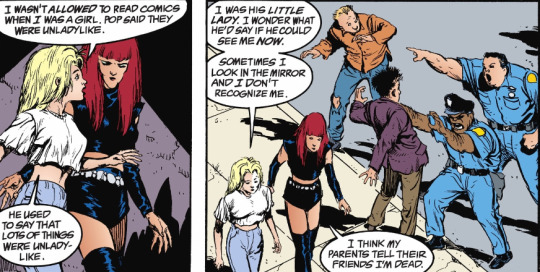
Barbie tells Wanda that she wasn’t allowed to read comics when she was a young girl. And that immediately struck a chord with me upon my first reading as a teenager: I was allowed to read comics, but I still remember getting the side-eye, especially from boys. Somehow, you didn’t belong to their club (even if you arguably knew more about Batman than they did 🤣). The reason Barbie gives us is that reading comics supposedly rendered her “unladylike” (yes, comics were considered “boyish”, at least when I was a teenager, and this is exactly the time we’re talking about here). But it’s not just about how a girl is supposed to act—it’s also about actively excluding her from something that’s only for men/boys. And while the topic of, “What’s a girl supposed (and allowed!) to be like?” isn’t something either particularly dwell on in that moment, Wanda faces the struggle of having to define and fight for her womanhood daily: As a trans woman, she feels resistance on a constant basis. When she talks about Weirdzos from the Hyperman comics, this is actually a nod to DC’s Bizarro, who could be described as Superman’s shadow (there’s a whole story why they were called Weirdzos instead of Bizarros in The Sandman, but that’d lead too far here. You’ll probably find it on Google).
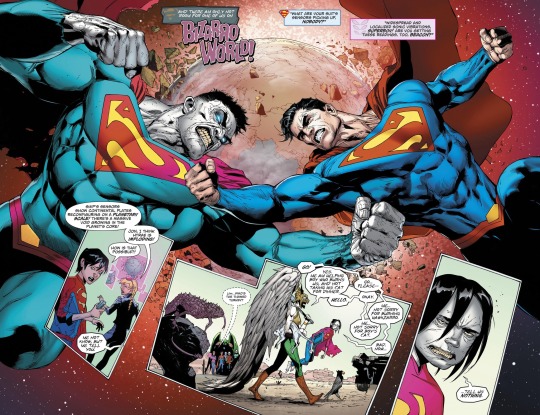
Close enough to the “real thing”, but always “slightly off”
And Wanda carries the shadow of her biology. All the time. There’s no escape for her, no respite, no true support.
We also see this in a scene with Hazel, one of Wanda's neighbours who lives in a lesbian relationship with her girlfriend Foxglove. Hazel noticed that Wanda has "a thingie." Despite the fact that a lot of “weird” things are happening in those panels, part of that is definitely that Wanda has not fully (in Hazel’s eyes) transitioned:
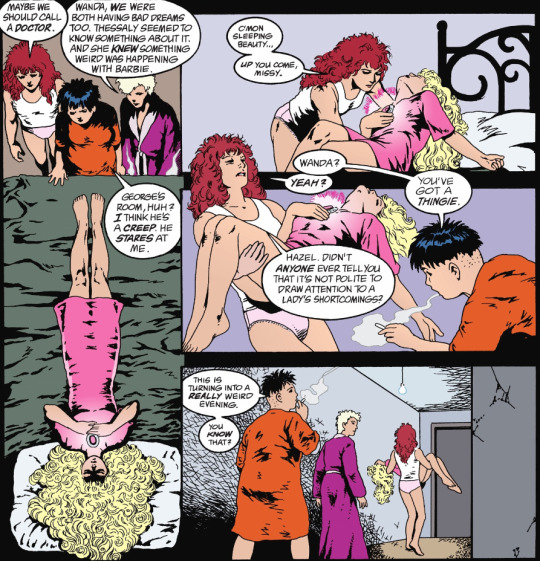
What is she, exactly (not who)?
And that question gets answered very painfully when Wanda, Hazel, Foxglove, and Thessaly come together to free Barbie from being trapped in the Dreaming. Thessaly is sure she can defeat the Cuckoo that holds Barbie captive. However, she needs menstrual blood to perform a ritual that will allow them to traverse the Moon Road into the Dreaming. During this process, Thessaly insensitively refers to Wanda as a man and prevents her from joining the journey with Foxglove and Hazel (and no, this isn’t about “Thessaly the TERF”—I already made my position on that clear and think that whole discussion needs a lot more nuance than fandom is often willing to engage in).
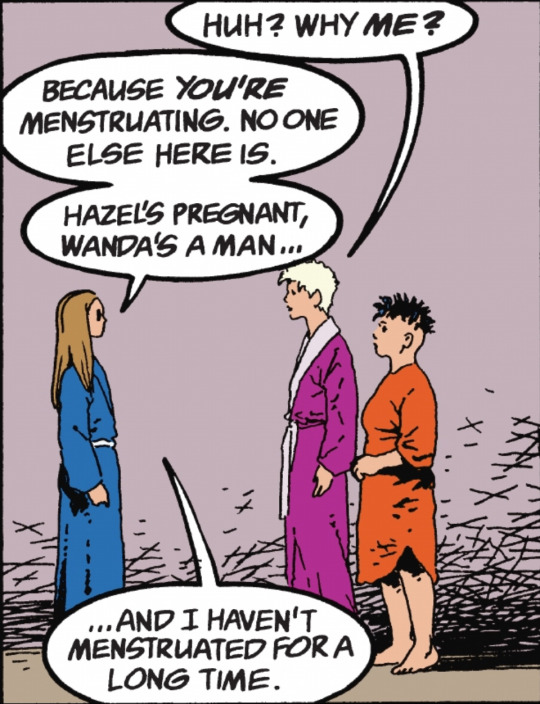
Maiden, Mother and Crone
Thessaly's statement, "This isn’t your route. It can’t be," further highlights the discrimination Wanda faces on a daily basis. She “isn’t” seen as a woman now, and she “can’t” ever be, even if she had reassignment surgery—Wanda would still be seen as a man by the ancient powers that be.
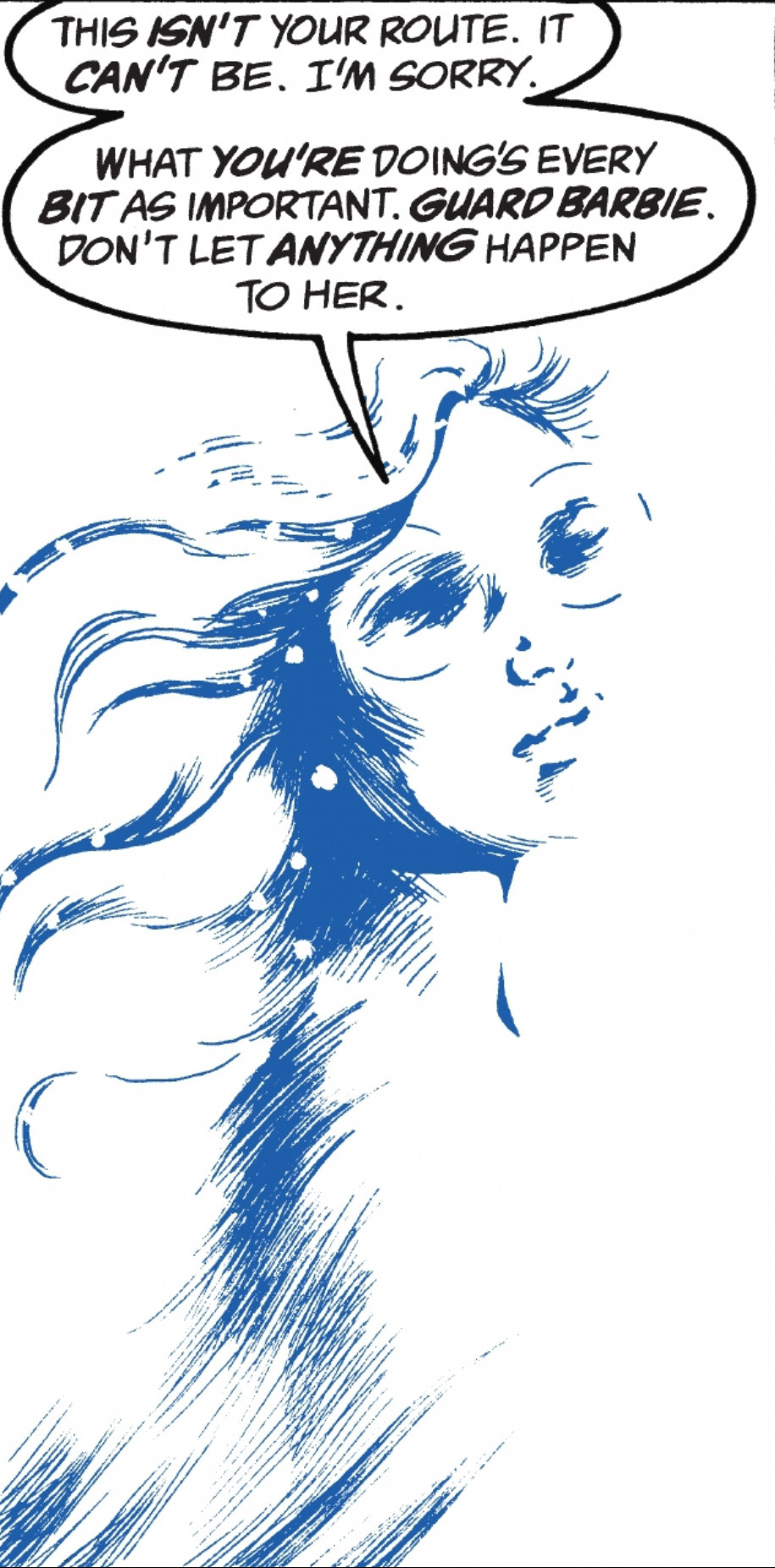
Wanda's struggle, more than any other character's, highlights the ongoing conflict between self-identity and societal perception of women. And that’s unfortunately still a struggle most women face. But Wanda’s character is particularly poignant because she is repeatedly forced to reaffirm her sense of self, only to be torn down again and again. Even Barbie, who always supports her and would probably never knowingly hurt her, says this when Wanda reveals her childhood name:
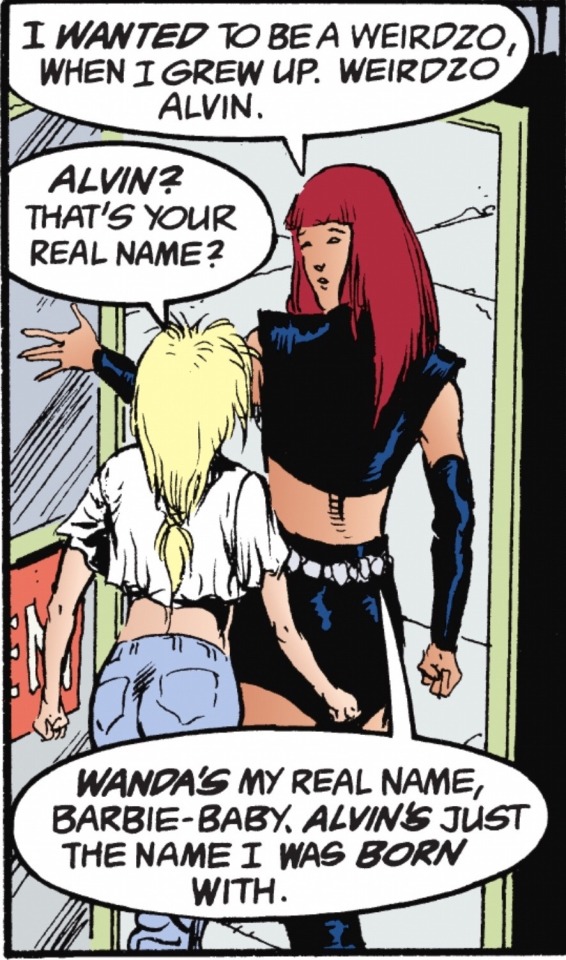
“Alvin? That's your real name?"
Please imagine what it must feel like if even the ones closest to you refer to your dead name as your “real” name, even if it’s without malicious intent (of course Barbie makes good on that later, but…).
Wanda can never truly find comfort in anyone. She is constantly confronted with the disparity between her self-perception and how the world views her. Ultimately, Wanda's exclusion from entering the Dreaming (and there’s more symbolism in that than you can shake a stick at—not just because she’s denied her womanhood, but also because she is denied entering a place of hope and possibility, and not least because she is denied being capable and having agency: Thessaly repeatedly acknowledges Wanda is important, and that she needs her help. But that’s on her terms, not Wanda’s) leads to her tragic death: The storm caused by drawing down the moon destroys the apartment where Wanda remains to watch over Barbie’s body.
And that’s why Wanda’s arc in the comics will always stay problematic to me (I don’t know how optimistic I can be for the TV series, because we’ve already seen her headstone in BTS shots, even if her overall arc seems to have changed): Dream grants Barbie a boon, which she uses to save the women in the Dreaming, but Wanda is not among them. There is no saving her—not in this world, not in any other.
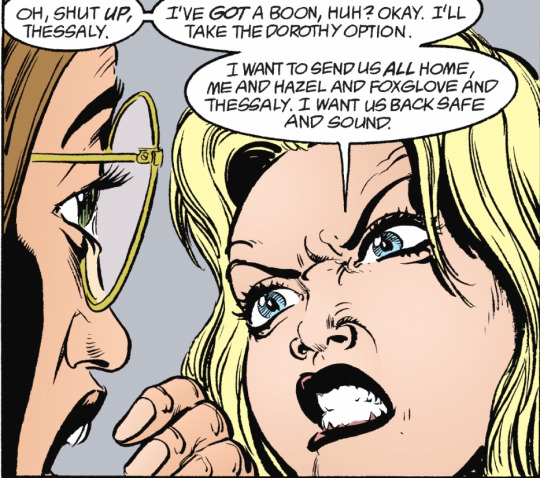
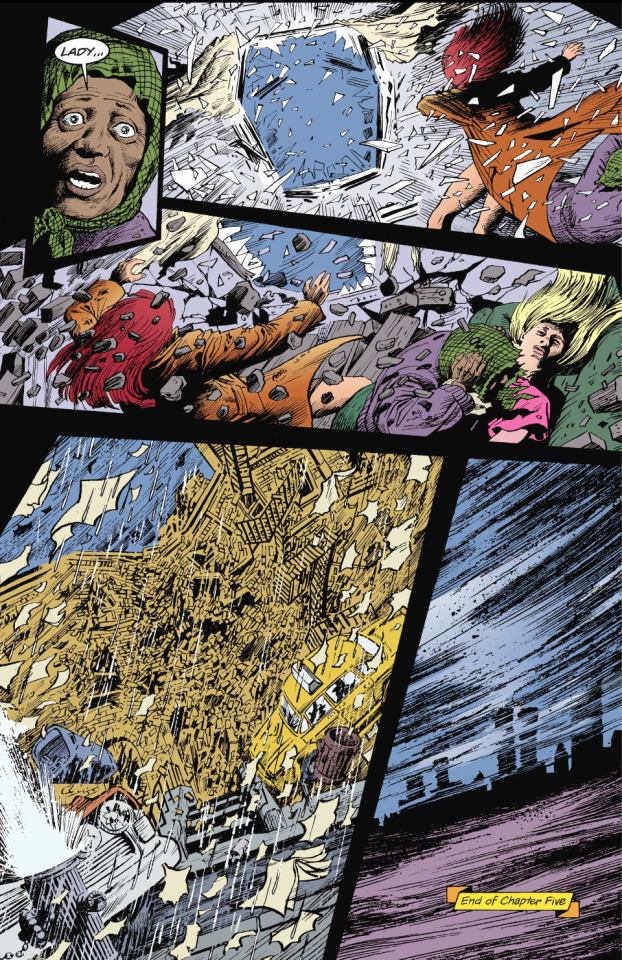
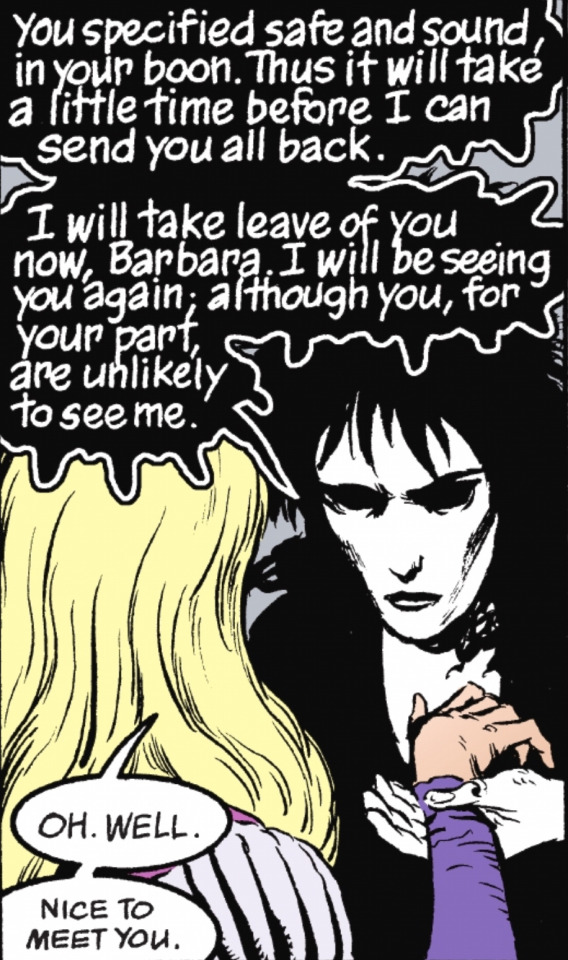
Wanda's conservative parents bury her with her deadname Alvin Mann (and her second name adds insult to injury, because it is the German spelling of “man”, as in “male”. And again, I’m somewhat glad they have changed this for the series, as seen on said headstone, because I never got why choosing that name was necessary in the first place. Or let’s say: I get it, but I don’t think it was needed and was layered on too thick. Sometimes subtle does it, sorry).
Why is Wanda so consistently shamed, while Hazel and Foxglove's lesbian relationship is regarded not a big deal (I’m obviously not insinuating it should be, see my disclaimer at the bottom of this post)? Although I have to admit there are things about that one that always rubbed me up the wrong way, too: The dumbing down of Hazel (honestly, most of us were not that clueless about reproduction in the 80s and 90s, lesbians or otherwise), the play on butch/femme stereotypes to then clumsily try to turn them on their heads (which did not work for me), the still somewhat male gaze applied to Foxglove (she didn’t have to sleep naked with her tits on display, did she?), the implication that all women somehow end up as mothers (if they don’t end up dead), even if just “accidentally”… There’s a whole lot to be said about the topic of motherhood, and how it gets instrumentalised in several Sandman arcs, but maybe that’s for another time...
To explore that question, I want to have a closer look at Barbie, who is a (in my view, often clumsy) stand-in for the gender-identity of many (CIS) women.
A quick throwback to The Doll’s House
The first signs of Barbie's identity crisis don't appear in A Game of You, but rather in The Doll's House. She is introduced as one half of “Ken-Barbie”: They finish each other's sentences, Barbie lacks a distinct personality and is completely overshadowed by being a “traditional wife” (maybe not the type of trad wife we think about today, and yet…). The fact that she and Ken share names with plastic dolls underscores the artificial nature of their identities and their relationship.
Barbie's dream-life always felt more authentic and meaningful to her than her waking reality—that’s why she is only a shell of herself when she can’t dream (after the vortex interlude with Rose Walker). She is passive, conforms to her father's expectations of being "ladylike" and adheres to “good” CIS- and heteronormative behaviour. And then, after her divorce, she feels uprooted, shows little motivation and relies on Wanda for support. Freeing herself from her shackles could have been a story of reclaiming her power without the layer of implied loneliness (I’ll get to that). Instead, she needs to suffer for a bit…
Barbie being trapped in her dream world also traps her in a state of passivity: Dreams are not real. You can make them real, but that’s not what she does—they are a maladjusted escape for her. And yet (or maybe rather “because”), instead of directly confronting and fighting the Cuckoo, Barbie smashes the Porpentine (much to the Cuckoo's delight).
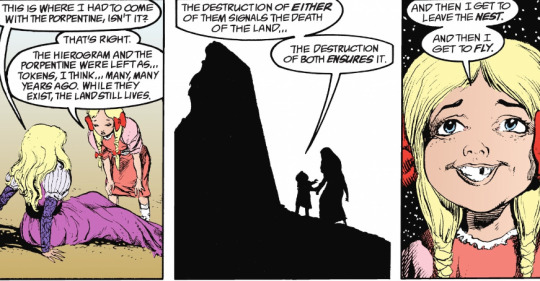
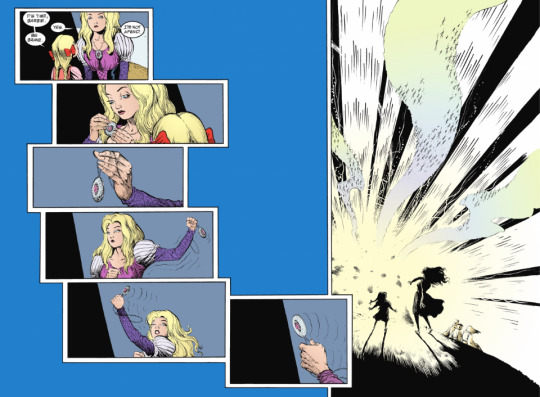
Upon waking…
Upon waking, Barbie's personality hasn't changed much from the woman we first met. When she goes to Wanda’s funeral, she struggles to defend Wanda from her transphobic aunt despite trying.
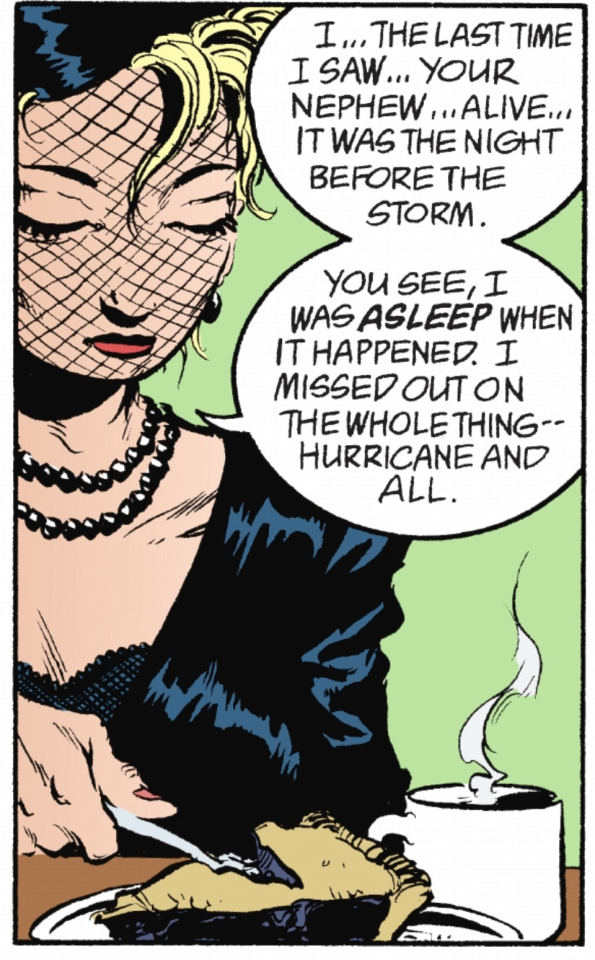
However, she engages in a small but significant act of rebellion by crossing out "Alvin" on Wanda's headstone with her favourite lipstick and writes her real name instead.
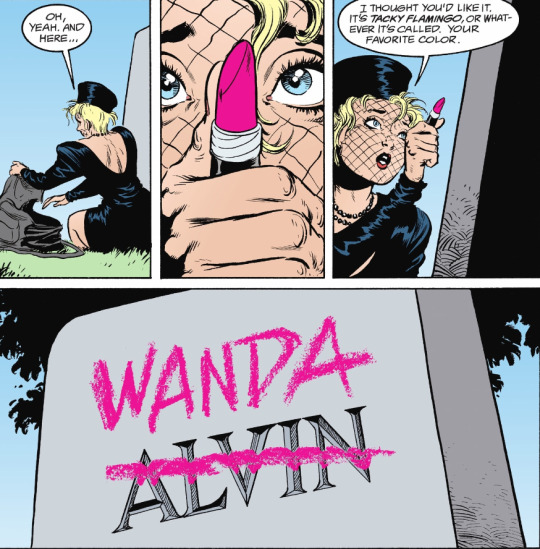
Barbie then recalls a dream she had while traveling to Wanda's funeral. In this dream, she sees Wanda not as she was in life, but as an idealised version of herself—soft, more curved, and wearing a pink dress. Death stands beside Wanda, symbolising that she is recognised for who she truly is.
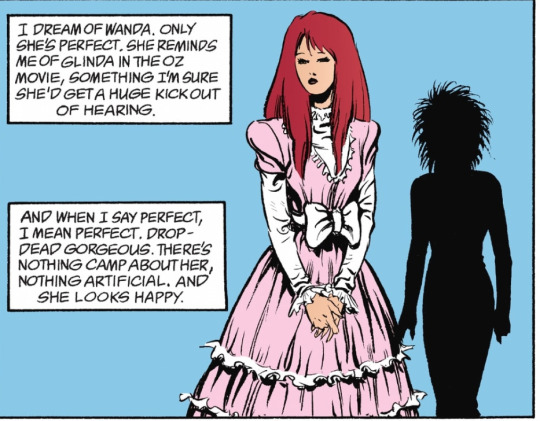
And I get it: The idea was to say, “She was always a woman, even to the cosmic powers that be. Eat that, Thessaly and everyone else.” But there’s also the part of me that wants to say, “You know what? She was good the way she was. Perfect in her imperfection. We didn’t need to affirm her womanhood by showing her as a stereotypical woman.” The use of “perfect” and “drop-dead gorgeous” always really rubbed me up the wrong way in relation to the way she was portrayed in that panel. Because it portrays a stereotypical woman: That’s what you look like if you need to/want to pass. And this applies, sadly enough, to all women in one way or another, no matter what gender we were assigned at birth. But if that scene holds meaning to people, I also get it. My more critical take on it is maybe down to my own history (again: disclaimer at the bottom of this post).
Simultaneously, the destruction of the Land in the Dreaming grants Barbie a newfound independence. She is now alone, without her best friend or the friends of her dreams, but these losses have given her freedom. And for a moment, loneliness becomes the ultimate resolution to Barbie's identity conflict. And I found that idea horrible, I’ll be brutally honest with you:
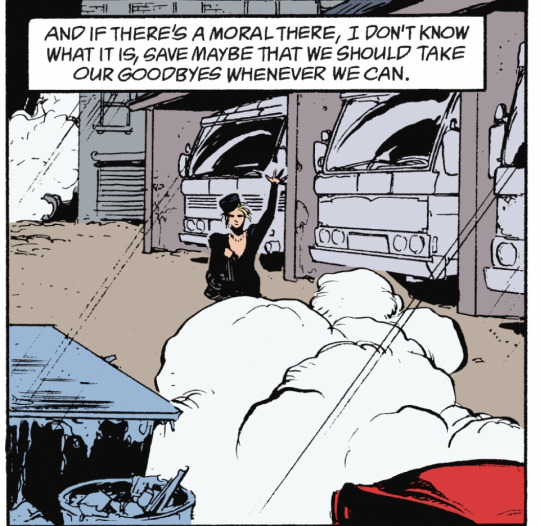
On the final page of A Game of You, Barbie is shown alone, waiting for a bus to an unknown destination. She reflects on her dream of Wanda, where she had the chance to say goodbye to her past life. For a moment, she stands rigidly still, and that moment feels… really long? Separated from her past and facing an uncertain future, she is free from anyone's expectations or desires. And maybe, in that simplicity, she finds freedom.
And maybe, A Game of You challenges the idea that we have full control over our identities. Our self-perception and how others perceive us are always influenced by external factors. And somewhat, I could never quite shake the feeling the story equates the removal of the ties that bind us (in this case: relationships) and/or death with freedom: Wanda only fully realises her identity in death, and Barbie feels most liberated when she is free from past entanglements and future obligations. Whether that notion is truly rejected in the end is probably down to the reader: Barbie turns and runs towards her bus, heading into a future that, while uncertain, maybe also holds a glimmer of hope. Unfortunately, none of the women of The Sandman get off particularly well in that department, and that is a common theme…
Disclaimer: I write this as a CIS bisexual woman in her 40s who has been in relationships with both women and men for 30+ years. Two of them led to marriage/civil partnership: One with a CIS woman, also bi (we were together for 10 years, 3 of them in a CP), one with my now husband (CIS straight man, married for 10 years, together longer, and we have a kid together). I don’t need to tell you this, but I am because I think it is important to disclose my own bias and experiences as a queer woman in the 90s, which include coming out, experiencing bi-erasure and misogyny from both inside and outside the LGBTQ+ community. As such, they will definitely colour the way I read and interpret A Game of You.
#the sandman#sandman#dream of the endless#morpheus#the sandman comics#wanda#Wanda sandman#sandman meta#thessaly#Thessaly sandman#Barbie sandman#hazel and foxglove#a game of you#hazel#foxglove#cuckoo sandman#the sandman barbie#sandman spoilers#the cuckoo the sandman#the sandman meta#queue
72 notes
·
View notes
Text
Ep 12 of my Utena fansub is out!
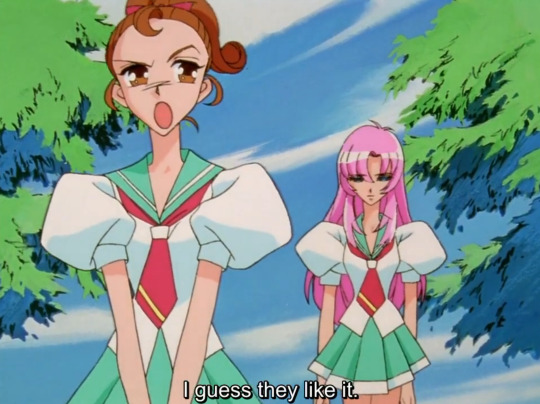
私たちも今までいろいろやってきた、疲れたわね
We've been so busy the last few episodes. I'm pooped.
A juicy little indulgence on my part here - the fourth wall break here by the shadow girls does not actually exist in the Japanese (explicitly). I’ll explain why I added it.
Here’s a very literal translation of the individual words above with no thought given to context or adjusting for grammar.
We (also) | until now | various different things | have done up to this point
I believe いろいろやってきた (lit. we’ve done various different things up to this point) is referring to their various performances in a sort of meta way. If we take each appearance of the shadow girls as a semi-in-universe mini stage play, this line is referencing the presence of previous plays within the current play. They’ve played pirates, plate spinners, cowboys, an educational program, and more! Acknowledging these things is tantamount to a performer acknowledging the fact that they’re an actor rather than a character while on stage, so the fourth wall break felt appropriate.
Anya was also happy with the fourth wall break and added that it emphasises the episode as a turning point and helps close out the arc, which I really agree with!
-----
また黙秘するわけね。今のウテナってかっこ悪いよ。何か取られた腑抜けみたい。なんだかわからないけど、取られたら取り返しなさいよ!
Are you clamming up again? You look pathetic right now. Like you let someone steal from you! I don’t know what it was, but if someone took something from you, take it back!
Couple of little things to discuss about this line:
かっこ悪い is often translated as “uncool” or “lame”. This can sometimes be accurate, since it’s the opposite of かっこいい (lit. cool), but in this circumstance those words don’t hit hard enough. This かっこ悪い is more barbed than usual, so I kept the barbs by choosing a different word: pathetic.
“Clamming up” was an off the cuff choice because I felt I’d used “be quiet”, “not talk”, etc too many times in the previous scene to reuse them here. I think it fits with Wakaba’s personality and the current situation pretty well! 黙秘 is defined by jisho.org as “remaining silent; keeping secret”.
腑抜け means “coward” or something similar. I tried phrasing this line a few times to get that word in somehow, but in the end the whole rant just read so much better without forcing it in. Also cps (characters per second) was a concern here.
-----
元気な友達がいるね。
Your friend has quite the personality.
元気 (genki). What a word! Often translated as “energetic”. So often in fact, that even before I checked, I knew that the ohtori.nu translation would have used it, and sure enough!
Your friend is very energetic. (from ohtori.nu)
Along with “eyesore” and “confession (of love)”, this might take the bronze medal for common Japanese words that consistently get translated into very uncommon English words.
Of course, 元気 can literally mean “having a lot of energy”, or simply “well” (as in the opposite of “unwell”). But “energetic” is just such a bad translation for it 90% of the time. I wish I could convey why in words, but in most contexts, the word 元気 and the word “energetic” just feel so different.
Anyway, 元気 has quite a positive nuance, which emphasises the passive aggressiveness of Touga’s comment. The intent with this line is that he’s giving a vague compliment to Wakaba, indirectly (talking about her as if she’s not there), and making it clear that he wishes she wasn’t around. Everything else about the line should be secondary, including the specific meanings of each word.
I think this is emblematic of my general approach to translation — to identify the author’s original intent of a line/scene/work and then write it in a different language with the same intent in mind. Every line, every scene, is trying to do something — I believe it’s the translator’s job to identify what each line and scene is supposed to be doing and preserve that, so media literacy is very important. Sometimes that line is doing exposition, in which case a literal translation of each word is often ideal. Sometimes that line is trying to evoke a feeling, establish a character, or make the audience remember similar experiences, in which case the individual words used matter much less. In this case, the line is attempting to invoke memories of similar experiences of passive aggressive, dismissive comments. And frankly, “Your friend is very energetic” does not do that, so I consider it a poor translation.
-----
Thanks as always to my ride or die @dontbe-lasanya for their awesome editing this episode (and every episode!)
Make sure to follow the blog for episodes as they're released. Go here for all previous episodes:
#revolutionary girl utena#rgu#shoujo kakumei utena#sku#translation#japanese#japanese language#langblr#utena fansub#official blog post
35 notes
·
View notes
Text
Mikage: Boy of the Black Rose
I've long struggled to write about Mikage, who I find to be an intriguing yet elusive character. or rather, his character is understandable--his motives and feelings are communicated clearly enough--but his narrative is one of the most inexplicable in RGU. thinking it over tonight, I put my finger on one aspect of the Black Rose arc which I previously didn't know how to approach: specifically, Mikage's relationship with the Boys of the Black Rose.
the boys act as a kind of collective character, a mass of faceless people who whisper in dark corners. since RGU is about social reality, it often uses extras to deliver exposition or set the mood. the Shadow Girls are meta characters, existing somewhat outside the narrative, but regular schoolgirls at Ohtori can serve a similar purpose. they might demonstrate that Touga and Saionji are considered the hottest boys in school, or gossip about Ruka and Shiori's recent breakup.
the Boys of the Black Rose are slightly different, maybe a little closer to the Shadow Girls. rather than acting as bit characters in the larger world of Ohtori campus, I believe their existence is contigent on Mikage. while this could be put in various ways, in the most straightforward terms, the writers created them to help reflect on Mikage's character.
only one Black Rose Boy is given a face: the first one Mikage (Nemuro) talks to. when Mikage asks not to be called "professor," since they are the same age, the boy replies:
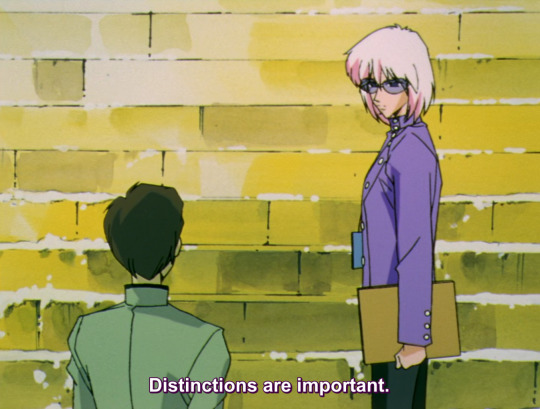
obviously, RGU relies on making its main characters visually distinct from "normal people." Wakaba calls them "special" and resents them. Utena is popular for her specialness, well-liked; in contrast, Mikage is an outcast for his. for a person to be special or a genius, there must be others for them to stand in opposition to. Mikage is set apart from his peers by his pink hair, by his unique uniform, and by being a professor.
after Mikage is introduced to his new work, the boys begin to gossip about him, saying he knows nothing about what's really going on at Ohtori. towards the end of this conversation, there's a shot of Mikage, and then he actually replies from the future to the gossip they were spreading about him.
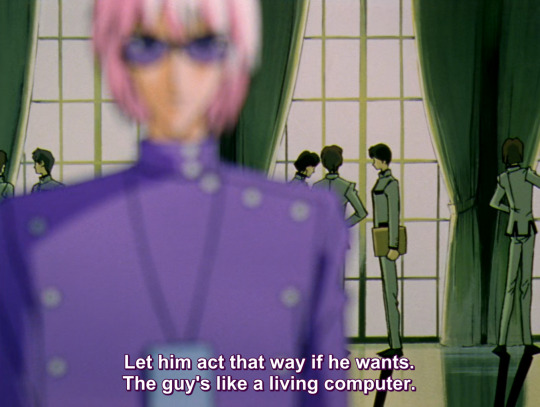
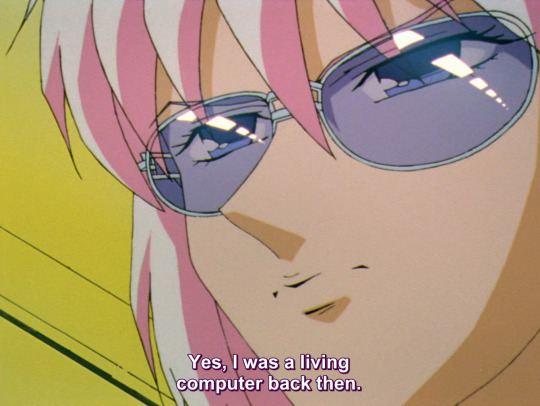
this is Mikage's eternal reality: his recollection of the past. even during the "present" of Utena's narrative, he is still walking through Nemuro Memorial Hall, which is why it's still standing, unburned. the Boys of the Black Rose that the audience sees are filtered through Mikage's memory; whether or not the boys really said these things about him is ambiguous. it's possible, but the important fact is that Mikage believes they did.
this transpersonal mirroring keeps Mikage trapped, unchanging. he feels himself defined as unable to connect with others, so he keeps away from them. this becomes a self-perpetuating cycle, leaving Mikage a total outcast.
even outcasts, however, are members of society. the Boys of the Black Rose actually have more in common with Mikage than the average Ohtori student. they're all scientists working on the same project. they have much of his coldness, sense of superiority, and intellectualism. the main difference is that they're the in-group.
while Mikage believes himself to be emotionless, it's made clear that his social isolation hurts him. he doesn't want to be set apart, but he doesn't know how to break through the barrier between him and others. it's very easy to do a queer reading of the character, given the way this is conveyed to the audience.
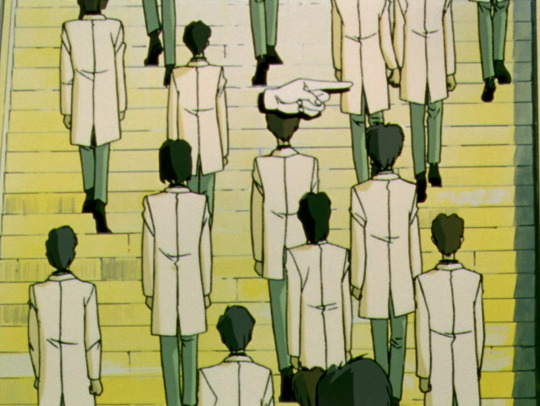
Mikage's fixation on Tokiko and Mamiya is easier to undestand with all this in mind. the world he was living in, occupied by the Boys of the Black Rose, was a cold and alienated one. in contrast, Tokiko has genuine passion, caring for her brother deeply. Tokiko's tears move Mikage, allowing his own buried emotions to break through the surface. but she also reinforces his social isolation; he is equally as hurt by her as he is drawn to her.
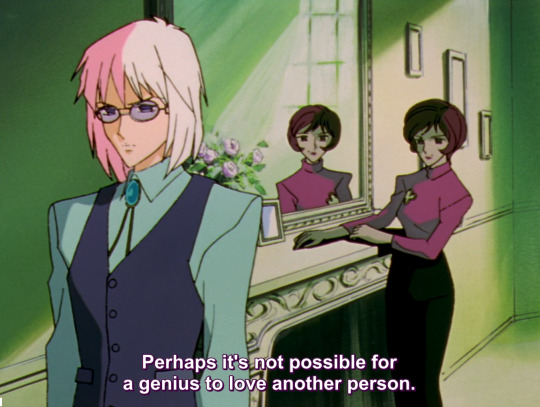
this is part of why Mikage is so determined to "defeat" Tokiko; she offered him hope of connection, but he was never able to "win" her, as men so often try to do with women.
Mamiya is something else altogether; a boy, like Mikage and the Black Rose Boys, but altogether different. warm, friendly to Mikage, not intimidated by his intelligence or reputation, and insightful. in a show full of characters obsessed with holding on (to the past, to a person, to their self-image), Mamiya is the only one who can see the wisdom in letting go.
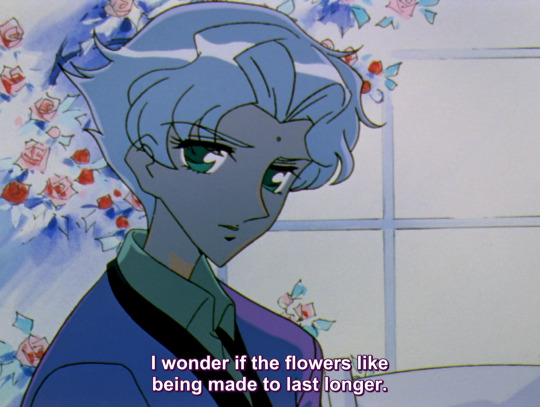
Mikage at first is open to Mamiya's words, preparing to call off their quest for eternal life. but like every character who threatens the system in RGU, he is faced with Akio. in a prototype of the later "End of the World" sequences, Mikage comes across the kissing Tokiko and Akio. this proves to be too much for him; there are some things he can't afford to lose.
the scene has significance to Mikage far beyond disappointment in love. he wanted to create a family with Tokiko and Mamiya; marriage to Tokiko would tie them together "forever." if he could be by Tokiko's side as they lost Mamiya, then at least he wouldn't be alone after his death. but if he's only Tokiko's coworker, when their work is done, he's back to being a computer.
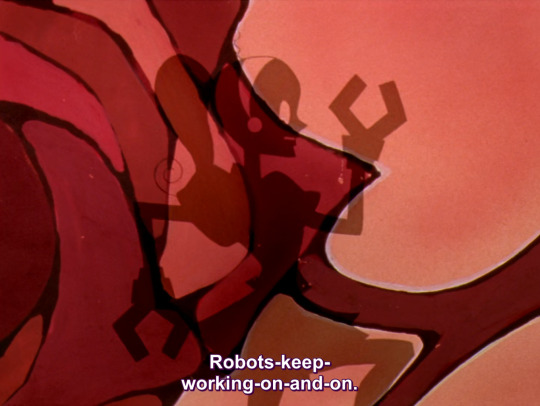
in desperation, Mikage plays into Akio's hands. under contract, he sacrifices the Boys of the Black Rose and burns down the hall that bears his name. when justifying himself to Tokiko, he claims that this act will allow them to attain eternity. in the events of the series, he's still at it: installing Mamiya as the Rose Bride will, after all, make him eternal, even though it's the very kind of eternity Mamiya wanted nothing to do with.
Mikage retreats into delusions on feeling the sting of Tokiko's rejection. though he is the one who betrayed her, he turns it around and feels betrayed himself. going even further, he casts Mamiya as the one who set the fire.
the Boys of the Black Rose are also used to emphasize his inability to face his own actions. throughout the arc, the boys are seen pushing coffins around. however, in episode 23, Mikage takes their place right before he is forced to face the truth about himself.
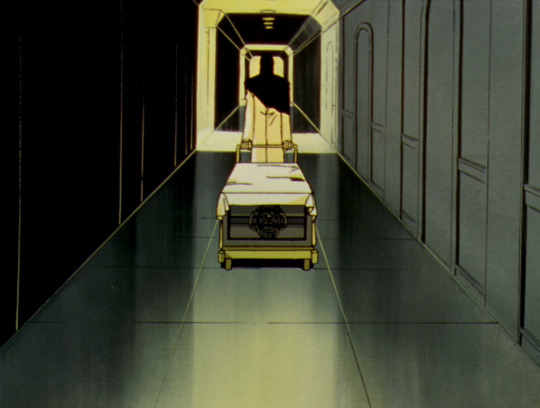
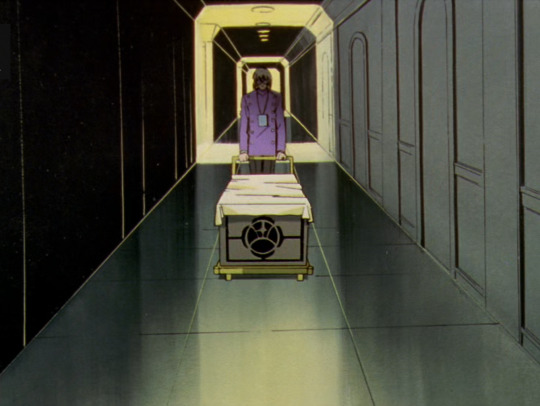
at the end of the arc, Miki claims that no one was hurt in the the fire, contradicting the previous story of Nemuro Memorial Hall. this possibly indicates that the murders are a figment of Mikage's imagination--the older Tokiko doesn't seem to react to him as if he's a murderer. more than anything, he seems guilty of self-denial and retreat from reality. Tokiko went on to accept Mamiya's death and even mourned for Mikage, while he ignored her in favor of his memories. the fact that he does not recognize her feelings is another aspect of his tragedy.
Mikage, through his fruitless revolution, loses the very things he always wanted. he attempts to throw away his past self, the cocoon of Nemuro hatching into the butterfly that is Mikage. with it, he burns away the boys who rejected him, who embodied the cold world he used to live in. he uses their sacrifice to enshrine Mamiya, idealizing him as the perfect companion. but as Ikuhara said, he was doomed to fail from the start:
Those who reject that place are, conversely, rejected by it as well. This is the nature of systems: the moment you reject them, you are forced to realize that they’re the very ground you’re standing on. Mikage noticed the trick behind the system, and he hurriedly attempted revisions. But the adult who’d created the system just said “Let’s not,” and unilaterally brought the curtain down.
the "trick within the system," is, I think, the fact that it's socially constructed. Mikage believed that on realizing this, he could simply remake the world as he wanted. he was allowed to do so for a time, when it was useful. when he ceased to be useful, he was dispatched with, because while he had operated within the system, he was not in control of it. and beneath his delusions, there was still a reality.
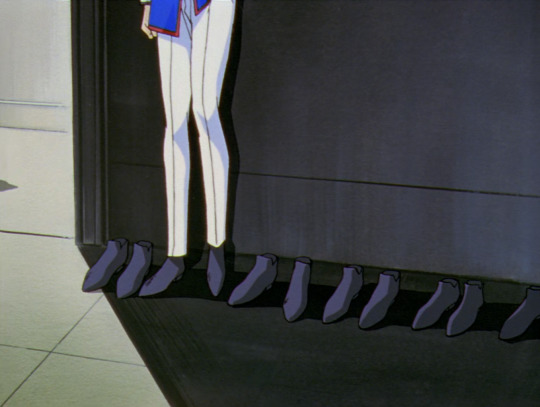
Mikage is the true Boy of the Black Rose: the true ghost, the true sacrifice, living in the desiccated world of a preserved flower. throughout the arc, he takes possession of Ohtori students who suffer from the same afflictions as him, and every time Utena defeats one of his duelists, another part of him is exorcised--another Black Rose Boy burned away. in the end, the only thing left of him is the ruin of Nemuro Memorial Hall, shown briefly in the final episode. he graduates at Ohtori, but only after losing absolutely everything. that seems to be the only way to step into adulthood: naked and shivering, like the day we are born.
149 notes
·
View notes
Note
Kissing you on the mouth for your Lance son of Hermes take. I didn't even really have an opinion before but after reading your post I'm immediately sold and so invested in the au
Do you have ideas on what the other characters godly parents would be? Hunk with Hephaestus makes sense to me, and I'm a fan of Keith son of Ares (learning to accept his godly dad could match with his arc about accepting he's part galra, a supposedly evil/violent side of him, + the anger and fighting skills), but not sure about the others...
hello!!! I'm glad you see the vision hehe. I actually sent many a paragraph to heynhay about this only yesterday. I was firmly on the son of Ares Keith headcanon but then... someone reblogged my post saying Keith son of Zeus (I think it was @pidges-lost-robot and i was like WAAAAIT.
Okay so here's my many many paragraphs explaining headcanons for each. Shiro son of Zeus: Okay so in my head Shiro & Keith are both sons of Zeus but for very different reasons. They're like Thalia vs Jason types. Shiro is a great leader, he's ambitious, he's brave, he's a legend. His dad is so proud. He's been on like 20 quests and absolutely demolished all of them. All the kids in camp know he's So Cool and Talented. He can be hot headed sometimes but ultimately he's really adept at setting aside his feelings for the Greater Good etc. Ideal hero type and ideal son to the big guy upstairs. Keith son of Zeus: Keith is all the bad traits of Zeus (sorry to him). He's got a short temper, he's impulsive, he's closed off. He's a prodigy without meaning to be. Everyone pays attention to him but (despite what Lance thinks) it's because they think he's a freak, he's not a big three kid the way you're Supposed To Be. And he doesn't want to be a leader. This really rubs Zeus the wrong way. Keith would rather disappear into the ranks of his fellow campers than be the star of the show and that goes against everything children of Zeus are supposed to be. His dad definitely refuses to claim him for a long time which makes Keith just some weird really powerful kid who doesn't know who his godly parent is. Luckily Shiro takes him under his wing : )) (too bad Shiro doesn't come back from his latest quest tho, no one knows where he went off to and Chiron doesn't want to send out a quest because if something kept Shiro The Legend from coming back to camp it must be really bad). Hunk son of Aphrodite: ANOTHER ONE I'M FIRM ABOUT. I think Hunk's defining characteristic is his love for his friends. Hunk is always looking for peaceful ways to solve problems, he's always forming relationships with people before doing anything else, he really values giving love to those around him. It also doesn't hurt that he's kind of squeamish and particular about a lot of things, as a lot of Aphrodite's children are. But I really think his greatest strengths are the ways he's able to relate to others. I know a lot of people say Lance is the glue that holds everyone together, but I think it's Hunk. I know the fanon is that Aphrodite's kids are all just big flirts but I think both Selena and Piper are great examples that that's not true, and Hunk would absolutely be their brother. Pidge daughter of Hephaestus: I've seen some people saying Athena for Pidge but that's another one where I just can't get behind it. Pidge is so smart in so many ways but so stupid in others. She's too impulsive and single minded to be a daughter of Athena, imo. Her main love is figuring out how things work, what makes them tick, and using that knowledge to help those she loves. Children of Hephaestus are know to hold grudges, fight for their families, and let's not forget Hephaestus spending literally all of his free time trying to play pranks on the other Gods with his little contraptions like that is all Pidge would do all day long. Plus she befriends a robot and that is who she talks to for the first like 3 episodes of Voltron that is so unbelievably child of Hephaestus energy. Anyway thank u for asking this question I've been thinking on it for days. I am also open to the idea of Shiro being a son of Athena, I think that would suit him well. And also in my head I like to think Keith would potentially just remain unclaimed until he stomped his way to Mount Olympus and forced whoever was his parent to fess up.
96 notes
·
View notes
Text
detailed character profile



Name:
First Name: Ezekiel
Last Name: Rookwood
Preferred Nickname(s): Kiel
Age:
Age in game: 16
Age of death: 46 (sort of got his happy ending i guess)
Gender/Pronouns:
Gender: Male
Pronouns: He/Him
Sexuality: pansexual
Appearance:
Hair: black and very straight
Eyes: warm ocean blue
Skin Tone: pale
Height: 6'1
Build: slim and muscular
Other Notable Features: nose-scar, very light birthmark above his left eyebrow
Clothing Style: usually shirts with rolled up sleeves and slim trousers
House:
Hogwarts House: Hufflepuff
Reason for House Selection: Very loyal to his father, and wishes to prove himself to him desperately. Easily angered with a very skewed moral compass, he will passionately fight for what he believes is right. Very reluctantly becomes morally good.
Blood Status:
Pure-Blood
Wand:
Wand Core: Thestral hair
Wand Wood: Elm
Wand Length: 12''
Wand Characteristics: crafted for the dark arts
Background/History:
Early Life: His mother died during childbirth and he was brought up in the shadow of his father's legacy. A lot of weight on his shoulders to prove his worth to his father.
Family Members: Rookwood is his father
Notable Relationships: eventually becomes good friends with Anne through Sebastian and she convinces him that he doesn't need to prove himself to his father, assuring him that evil is not inherent and he has the opportunity for good. He kills his father for her.
Event Leading to Hogwarts: His father enrolled him under the name Kyle Ashton to infiltrate.
Personality Traits:
Positive Traits: brave, fierce, loyal
Negative Traits: impulsive, murderous, reckless
Core Values: very very strong sense of vengeance, an eye for an eye kind of a thing
Fears: not being good enough
Hobbies/Interests: quidditch chaser, gets on really well with thestrals.
Skills and Talents: talented in the dark arts, and therefore talented against it.
Quirks: he hums when he sleeps, don't let it fool you, he's dangerous
Character Arc:
Main Goal: to prove himself to his father, and after Anne, to prove himself to her.
Challenges: the sinking feeling of believing that evil is inherent in his veins and he will never be good
Growth: uhhhhhhhhh lots of it
Magical Abilities:
Special Ability: ability to harness ancient magic
Strength in Magic: charms
Weaknesses in Magic: potions
Relationship with Magic: he thinks he is magical 🙄
Key Relationships:
Friends and Allies: Sebastian is his closest friend. He didn't like Ominis at first, but Ominis had a very large part in his ascent to good. Natty loves him, they're like siblings.
Enemies or Rivals: surprisingly none. he just kills whoever his father tells him to, so people probably hate him, but he doesn't hate anyone.
Romantic Interests: Anne Sallow, definately hooked up with Sebastian at some point.
Important Events in the Story:
Initial Conflict: his initial goal was to get to the source of the ancient magic to use it in his father's favour. Changed his mind due to Ominis and Anne.
Turning Points: Finding out the Rookwood cursed Anne
Final Goal/Achievement: to die happy :)
Miscellaneous:
Favorite Magical Creatures: PUFFSKIENS
Favorite Spell: avada kedavra. in his words it's "quick, safe and painless"
Favorite Potion/Herb: anything that smells good
Special Abilities or Artifacts: not magical but he wears too many rings



21 notes
·
View notes
Text
Okay,like a couple minutes ago I learned that it is actually trans day of visibility today soo woohoo! Kind of hard to celebrate in this shithole called the UK though, so I’m going to hide on tumblr and talk about which characters I think are trans coded or just Headcanon as trans because it’s my day I can do that now heheheh-
Also, I’m just tryna do a little thing for trans visibility day, I like being opaque, I ain’t trying to start any arguments, if you see a Headcanon you disagree with, just scroll. And if you think I’m biased towards transfem characters, it’s because I am and I ain’t apologising for that, they’re underrated in terms of fandom and obvs I’m transfem so I love them and relate to them more. Transmasc characters still will be on this list though as there’s so many that I love.
Characters That I Think Are Transgender Because Fuck You
Number one: Hunter Noceda (The Owl House)

This was probably the easiest and hardest pick for the list, for a couple reasons. Number one, I don’t think there’s a single person who agreed this pathetic wet cat is cisgender. Whether you think he’s transmasc, transfem, something else entirely, he ain’t cis. It’s clear why the fandom clung to Hunter as the resident trans character, him having a secret identity via The Golden Guard (seriously, any character with a secret identity is immediately trans, I don’t make the rules), the overconfident attitude mixed with deep insecurity and his arc about finding a way to ‘like who he is right now’ in Thanks To Them really just sealed the deal. Other little details like how his hair cuts helped him find his new identity did not help his case.
While I personally think he’s transfem, and am just using he/him because that’s his canon pronouns, Hunter is one of those characters that a lot of people can identify with which is what The Owl House is really about so I kinda had to include him on this list. The reason it was a hard decision is because holy fuck, every single character in this show is trans. Deciding between him and Amity was the hardest choice of my life because transfem Amity is heavily underrated and I love her, but you really can’t compete with Hunter, he’s had an amazing influence on the fandom and the character has probably helped a lot of people come to terms with their identity.
To summarise, Hunter is a great character, I miss him everyday, I miss The Owl House everyday, he was cool as fuck and a lotta people identified with him.
Anne Boonchuy (Amphibia)

This is one that I feel is heavily underrated, and that’s coming from someone that took two years after the show ended to watch Amphibia. With Amphibia, pretty much all of the human characters are Headcanonned (is that a word?) as some part of the trans umbrella but Anne is the one who does not get enough attention, especially for a main character.
At least to me, Anne was very transfem-coded in the show, everything from her raggedy appearance, to her essentially assuming a new life in Amphibia to the arc about accepting who you are to THE SONG ABOUT ACCEPTING WHO YOU ARE-this was the most in your face, trans-coded rep I could ever ask for. But she is criminally underrated in terms of being viewed as trans rep even though I’ve found her story one of the most compelling in terms of trans coded storylines in nearly any piece of media I’ve ever seen. Give Anne more attention, she’s literally the best. Marcy and Sasha are cool too but Anne’s writing deserves so much more praise than it gets.

Dipper Pines (Gravity Falls)
If you haven’t realised it yet, this entire list so far is just one massive fuck you to Disney because fuck Disney. Dipper was the closest we got to having a canon trans main character in a mainstream animated show and it was taken from us, fuck Disney y’all. But still, Alex has all but confirmed Dipper’s identity as trans masculine, you can see remnants of that arc with him learning that he’s a man in his own right and masculinity being something he can define for himself, the whole thing about Dipper actually being a nickname, and him bonding with the men in his life, like Stan.
Even though I didn’t notice it when I was a kid watching the show, rewatching it now with the knowledge of Dipper’s identity makes the experience a bit more personal, I can see bits of myself in Dipper and I think that’s the whole point of his character. Watching it as a kid you can relate to him because of his sarcasm, his bluntness, his comedy but also because of how heroic, adventurous and curious he is, he’s basically the idealistic role of the viewer. But as you get older and think more critically about him, you can see more of his flaws and that makes him so much more real and so much more relatable. Obviously being trans isn’t a flaw, that was just me doing a side tangent because Dipper means the world to me and is only the standard of writing a cartoon protagonist in some ways, I just think he’s a really cool character and Disney robbed us.
Also Pacifica is transfem because TfT couples are hecking adorable

Sallie May (Helluva Boss)
Guess who just realised that (other than Dipper technically) I haven’t put a single canon trans character on this list. Headcanons are better, I don’t make the rules, but Sallie May is amazing. No matter how critical you are of Helluva Boss, one thing it unapologetically does well is queer representation. The amount of characters that the audience can relate to makes it almost addicting to watch as you get to watch these characters live their best lives. Well, their lives are kinda fucked but you get what I mean, they just get to live as queer people, most of the time.
And Sallie May is proof that trans people will eat up absolutely anything, even if it’s a whole thirty seconds of screen time of a trans character. Being fair to her, Sallie May eats up every moment she gets on screen, her dialogue can be equivocated to just a middle child acting like a middle child and I think it is partly that, I feel like we have a lot more to learn about Sallie May and in turn her sister Millie. At least I hope we do, Millie’s writing needs to improve, their family dynamics can be so interesting because every other one of their siblings is a boy, their parents can be judgemental, I feel like even if Sallie May can be a bit taunting to her, those two are probably really close, especially since Millie is one of the people Sallie May would have to go to for girl advice.
To summarise, since I went off on a bit of a tangent, Helluva Boss brings out the worst in me, give Sallie May and Millie more screen time, they’re the best, we love healthy sibling dynamics.

Double Trouble (She-Ra)
Jesus, they’re hot. Anyway, the first non binary entry on this list, the fabulous Double Trouble who stole the entire show from the moment they were introduced. Throughout the entirety of the last season, I can remember just waiting for the point that they’d show up again and nearly screaming when they did.
Double Trouble was one of the most charming members of the She-Ra cast and became effortlessly iconic, conning every single character, playing both sides of a war so that they’d come out on top, and they did win in the end. DT basically had zero consequences and even got to flirt with Sea Hawk when they were reintroduced so they got a win really. Double Trouble was mean, condescending and a liar and I love them so, so much, them being a shapeshifter is just absolutely perfect and fits their character so well. It was nice to see Non-binary rep in a cartoon and have it not immediately be cancelled, looking at Disney and thank God it wasn’t because She-Ra really wouldn’t be the same without this manipulated, child of a bitch

Crowley (Good Omens)
You know the gender’s hitting when you don’t even know what the fuck the gender is. Crowley is a delight of the character from the moment they’re introduced to the end of the show, which nearly broke my heart since I watched it just recently, if anybody would like to send me tissues, that would be greatly appreciated.
From my vast research of one google search, I’ve concluded that they’re gender is up to viewer interpretation which is actually what mine is too so I can respect that. This literal demon stole the show whenever they were on screen, whether it was David Tenant’s acting, the moments we saw softer sides of him, her pinning over Aziriphale of them just being an actual demon, Crowley is a wonderful piece of representation and I hate that because it makes me sad, let them get together, please.

KFC
Not to be confused with that one place that makes pretty good chicken, I’m talking about the protagonists of two of the best RPGs ever made, Undertale and Deltarune.
For those unaware, KFC is the trio name of Frisk, Undertale’s protagonist, Chara, Undertale’s narrator and Kris, Deltarune’s narrator. Despite them being the main characters, they’re not characterised too strongly as you are in control of them for most of the game, minus Chara who specifically says you aren’t in control of them. Due to it being canon to the games that you are playing as these characters, the Internet started a rumour that they are whatever gender you want them to be, which was just never true. Undertale is packed with trans representation, and these three are no exception. It’s the whole reason I added them to the list actually, just to get the message across if anyone was unsure; they’re all Nonbinary.
Frisk and Kris, despite only having glimmers of their true characters in the game, are still very lovable and intriguing with their actions. Even just the idea of these two being controlled, which is more of a heavy theme in Deltarune, is enough to make you interested in their characters, especially when Kris starts fighting back against you. This entire section is just gonna be a couple paragraphs of me fighting back the urge to yap about Undertale lore so you’ll have to forgive me. Chara, being the only one not under your control, has a much stronger character through the lines of dialogue from them or said about them, the latter usually being more interesting as it gives you insight to their tragic life.
Undertale is one of my favourite and given the amount of rep it’s given us, I had to pay homage to its own main characters on this list. Even though I’m hungry cause now I’m thinking about KFC.
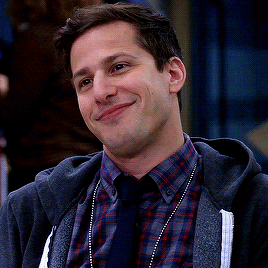
Jake Peralta (Brooklyn Nine Nine)
I think it’s been a year since I finished tumblr’s favourite sitcom and while Jake was lovable, he didn’t stand out to me too much. Still, this guy suffered from that overconfidence but riddled with insecurity personality which lead to him being inevitably headcanonned (it’s a word I decided) as trans masculine. I don’t know what the correlation is between those kinds of characters and the transmasc headcanon, maybe it’s the desire to present as being that confident, maybe it’s being that confident but still held back by struggles about your gender identity but that’s neither here nor there.
What is here and is there is that this show was amazing for trans people, even if only in small ways and Jake was no exception to that. He was funny and watching him grow through those eight seasons gives you one of the most satisfying and heart throbbing conclusions to a TV show, largely due to his presence as the main character. Even though it’s not canon that he was trans masculine, the Headcanon is so popular that I had to pay homage to him and add him to the list.
Jack Kennedy (DSAF)
Is this fandom so dead and so unpopular that I couldn’t find a good gif? Yes. Am I gonna talk about it anyway because I love these games and I want an excuse and this is my day? Yes.
Anyway, Jack Kennedy was the main protagonist of the Day Shift at Freddy’s games and if you don’t know what those are, there’s a 50% chance you had an alright childhood. DSaF is obviously a fan game of the more well known horror franchise Five Nights at Freddy’s and I think they are some of the best fa games ever made. They’re hilarious, they’re so low budget it’s insane, it can give you the hardest tonal whiplash of not taking itself seriously to one of the hardest stories you’ve ever went through seamlessly and I don’t even get a fuck. The story told by these games is done so well and evokes so many emotions but one important thing it’s done is actually be really great for queer rep.
Despite it being played for more of a joke in the earlier games, the two characters Jack and Dave Millie clearly have romantic chemistry and that was so important back when the games released since they became so mainstream due to being attached to a popular franchise. Many fans headcanon Jack Kennedy as being non binary, which is a label that I think really works for them, mainly because it fits for the protagonists of roleplay games to be non binary. I can’t explain why, it just makes presenting the character to the audience so much easier and makes them a lot easier to play without having to worry too much about the gender of the character.
Anyway, Jack’s a self described asshole with a noble goal, and playing as them really gives you a feel of their character and makes you understand why this little known indie franchise snuck into so many people’s hearts.

Bridget (Guilty Gear Rising)
You know I had to end off the list with one of the most iconic, canon, transfem characters out of there. Pretty much every single transfem has heard of Brisket and not a single one has played Guilty Gear Rising, I had to look up the name of this game just before this to make sure I got the right one.
Bridget has recently become a meme on the Internet, with every other transfem having her in her pfp, Bridget became a staple in the community. As stated, I can’t talk too much about her character but seeing the Internet come together to just appreciate this one transfem character, despite their being obvious hate and pushback and claiming her being canon transfem was a ‘mistranslation’ (to my knowledge) was actually really heart warming.
I didn’t really get trans day of visibility too much, I was happy for it, thought it was cool we got a day but it didn’t really help us all that much. But the more I thought about Bridget is the more that I saw just how good it can feel when people come together. It doesn’t have to be a movement or a call to action to save trans people from another bill trying to wipe them out, which is just depressing to listen to, it can just be as simple as joking about this character that barely any of us know. That level of community made me understand what this day was actually about; finding common ground and letting at least one other person know that they’re not alone, that there’s so many people just like you out there, that went through the exact same thing as you did at some point. And to let you know, those people turned out fine, so you’ll be okay too.
Happy trans day of viability everyone, even if this list only reaches one person to let them know they’re not alone, I’ll be happy with that.
Anyway, ignore the emotional stuff there, here’s my honourable mention of

EVERY SINGLE SPIDERMAN, SPIDERWOMAN, SPIDERPERSON, TO EVER EXIST, THEY’RE ALL TRANS, YOU CAN’T CONVINCE ME OTHERWISE
#transgender#transmasc#transfem#trans ftm#trans mtf#trans day of visibility#trans representation#transgender rep#the owl house#amphibia#hunter noceda#gravity falls#dipper pines#helluva boss#sallie may#she ra#double trouble#undertale#undertale frisk#undertale chara#deltarune#Deltarune kris#dsaf#dsaf jack#brooklyn nine nine#b99#jake peralta#crowley#good omens#Bridget
109 notes
·
View notes
Text
if i ever have to see another thought piece on the description of the white picket fence outside of fjord and jester’s place in mighty nein reunited indicating jester’s unhappiness in the relationship i will burn the world to the ground.
a) heteronormativity doesn’t exist in exandria !
b) fjord isn’t your Typical Male Love Interest Guy. if i ever have to read someone say that shit again i’m gonna (correctly) assume they haven’t paid attention at all to campaign 2 and any of fjord’s character arc.
c) perhaps, jester lavorre, woman who was raised on the ideology of romance novels and sexuality as exchange, might just find it uh… not a terrible thing that the white picket fence is falling apart outside since… fjord explicitly does Not feel like those romance novels to her, instead he feels comfortable. the way that a brightly painted but rarely used house might, especially when the couple in question spends most of their time adventuring together… which is an essential part of jester’s motivations throughout the campaign.
d) the reason fjord and jester seem unhappy in the reunion might be because, well, uh, whereas everyone else was getting a “vacation”, jester and fjord’s life together (specifically the fact that Fjord Loves Jester Enough To Risk The World (Momentarily) To Save Her) was the inciting action for an apocalyptic demigod being released - they Were unhappy. who wouldn’t be given those circumstances. jester nearly died, and fjord felt like the god that once saved him had now abandoned him, i am so truly sorry that their romance was not satisfactory for your vision of atypical romance (which, by the way, is literally reinforcing the restrictive romantic tropes you think you’re criticizing, so good job i guess). i would be much, much more concerned if jester and fjord Weren’t clearly dismayed.
e) both fjord and jester are individuals whose entire lives and character are defined by the expectation (both external and internal) that they behave and emote a certain way. that they’re in a relationship with someone who they feel that they can show that they are frustrated with or disagree on the layout of their house with or have different ideas on how to deal with the looming threat of a demigod is incredible. jester and fjord are emblematic of a relationship in which the characters Aren’t meant to be, but they Want to be together and they want to understand and support the other person so they work at it. we wouldn’t have conversations like “you seem disheartened..” “i am very disheartened! you almost died!” if they didn’t take the time and care to communicate with one another.
f) if you want a honeymoon era joyful queer romance, yasha and beau are right there! they are explicitly horny and in love and bright about it! if queerness is your measure of “trope breaking” i am very sorry to tell you that queer people partake in white picket fences, and i’d actually argue that in terms of Lifestyle Metaphor, beauyasha are more adherent to the whitepicket fence, nuclear familyism. this isn’t a detriment to them, just, very literally, beau works a 9-5 where she comes back to her housewife who gardens and cooks dinner and their future includes explicit reference to children. comparatively, fjord wants to address some issues in his past, jester is an artist, and both of them are interested in adventure for the foreseeable future.
g) if you truly think that a single part of laura’s description of the part-time abode of fjord and jester overrides every interaction and choice that both laura and travis make towards fjord and jester caring for each other in a deep and meaningful way that goes beyond the weird fandom constructed Man/Woman characters being portrayed by a married couple i truly, Truly have no idea why you even watch the many hours of content that cr is when you could… play/write your own shit.
#usually i would simply block and ignore but! i got one of those weird twitter recommended tweet notifs#and there were far too many likes#also like. ppl talk about that home as if it is where fjord and jester are living their everyday life#they are on the ship most of the time. of course it’s downtrodden and illlooked after. they are adventuring. they’re writing their own story#fjord#fjord stone#jester lavorre#fjord + jester#fjorester#critical role#cr2#mighty nein#cr meta#kinda#i’m not tagging this discourse because it’s stupid and against my principles if u don’t like this block me :)#the mighty nein
380 notes
·
View notes